In Vitro Fertilization Research Methods
VerifiedAdded on 2020/10/23
|25
|8854
|363
AI Summary
This assignment provides a comprehensive overview of research methods and studies related to in vitro fertilization (IVF). It includes a list of references from academic articles and books that discuss the impact of IVF on psychological well-being, marital relationships, sexual relationships, and quality of life. The references also cover various research methodologies used in IVF studies, such as qualitative inquiry, systematic literature reviews, and more. This assignment is suitable for students who are interested in reproductive health and IVF research.
Contribute Materials
Your contribution can guide someone’s learning journey. Share your
documents today.

Research Project
Secure Best Marks with AI Grader
Need help grading? Try our AI Grader for instant feedback on your assignments.
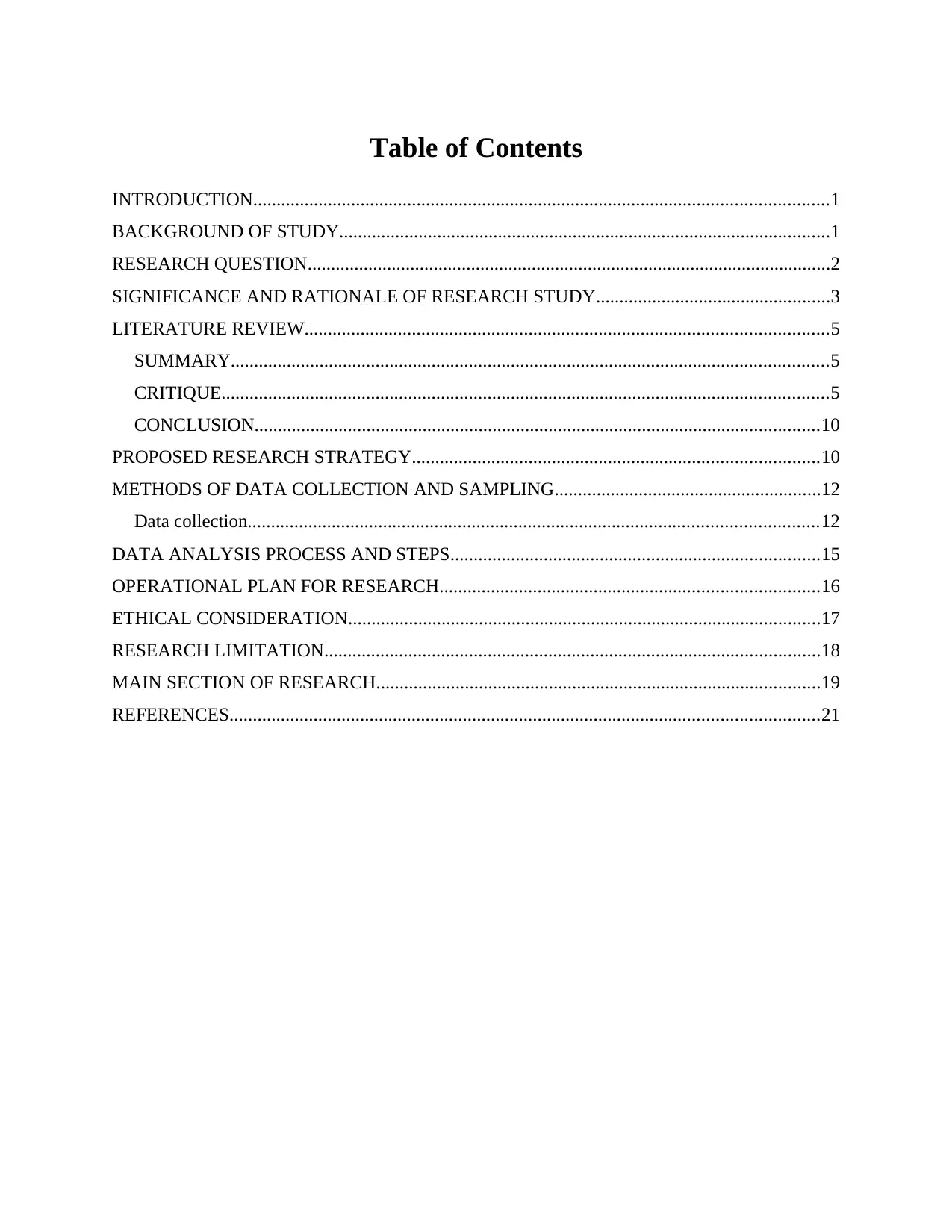
Table of Contents
INTRODUCTION...........................................................................................................................1
BACKGROUND OF STUDY.........................................................................................................1
RESEARCH QUESTION................................................................................................................2
SIGNIFICANCE AND RATIONALE OF RESEARCH STUDY..................................................3
LITERATURE REVIEW................................................................................................................5
SUMMARY................................................................................................................................5
CRITIQUE..................................................................................................................................5
CONCLUSION.........................................................................................................................10
PROPOSED RESEARCH STRATEGY.......................................................................................10
METHODS OF DATA COLLECTION AND SAMPLING.........................................................12
Data collection..........................................................................................................................12
DATA ANALYSIS PROCESS AND STEPS...............................................................................15
OPERATIONAL PLAN FOR RESEARCH.................................................................................16
ETHICAL CONSIDERATION.....................................................................................................17
RESEARCH LIMITATION..........................................................................................................18
MAIN SECTION OF RESEARCH...............................................................................................19
REFERENCES..............................................................................................................................21
INTRODUCTION...........................................................................................................................1
BACKGROUND OF STUDY.........................................................................................................1
RESEARCH QUESTION................................................................................................................2
SIGNIFICANCE AND RATIONALE OF RESEARCH STUDY..................................................3
LITERATURE REVIEW................................................................................................................5
SUMMARY................................................................................................................................5
CRITIQUE..................................................................................................................................5
CONCLUSION.........................................................................................................................10
PROPOSED RESEARCH STRATEGY.......................................................................................10
METHODS OF DATA COLLECTION AND SAMPLING.........................................................12
Data collection..........................................................................................................................12
DATA ANALYSIS PROCESS AND STEPS...............................................................................15
OPERATIONAL PLAN FOR RESEARCH.................................................................................16
ETHICAL CONSIDERATION.....................................................................................................17
RESEARCH LIMITATION..........................................................................................................18
MAIN SECTION OF RESEARCH...............................................................................................19
REFERENCES..............................................................................................................................21
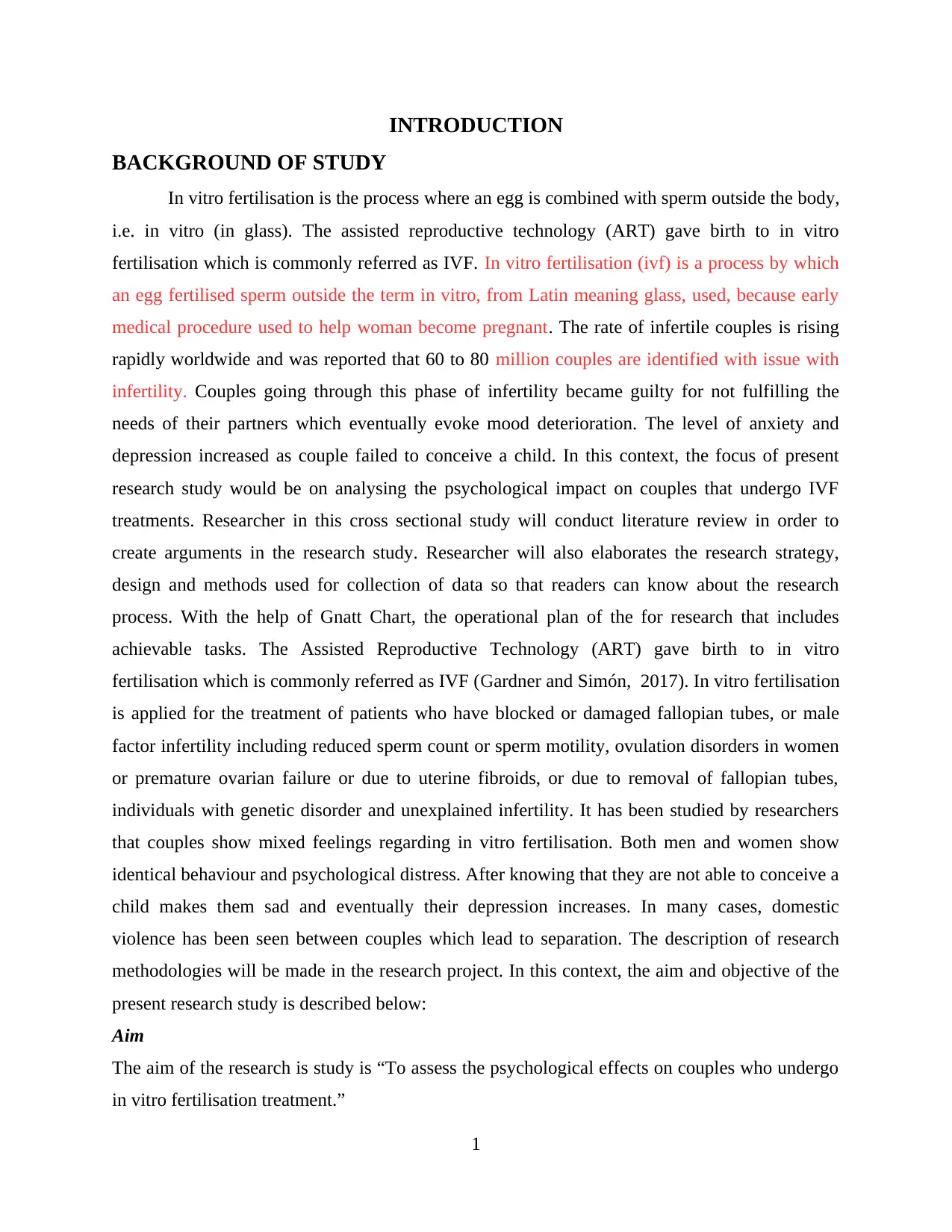
INTRODUCTION
BACKGROUND OF STUDY
In vitro fertilisation is the process where an egg is combined with sperm outside the body,
i.e. in vitro (in glass). The assisted reproductive technology (ART) gave birth to in vitro
fertilisation which is commonly referred as IVF. In vitro fertilisation (ivf) is a process by which
an egg fertilised sperm outside the term in vitro, from Latin meaning glass, used, because early
medical procedure used to help woman become pregnant. The rate of infertile couples is rising
rapidly worldwide and was reported that 60 to 80 million couples are identified with issue with
infertility. Couples going through this phase of infertility became guilty for not fulfilling the
needs of their partners which eventually evoke mood deterioration. The level of anxiety and
depression increased as couple failed to conceive a child. In this context, the focus of present
research study would be on analysing the psychological impact on couples that undergo IVF
treatments. Researcher in this cross sectional study will conduct literature review in order to
create arguments in the research study. Researcher will also elaborates the research strategy,
design and methods used for collection of data so that readers can know about the research
process. With the help of Gnatt Chart, the operational plan of the for research that includes
achievable tasks. The Assisted Reproductive Technology (ART) gave birth to in vitro
fertilisation which is commonly referred as IVF (Gardner and Simón, 2017). In vitro fertilisation
is applied for the treatment of patients who have blocked or damaged fallopian tubes, or male
factor infertility including reduced sperm count or sperm motility, ovulation disorders in women
or premature ovarian failure or due to uterine fibroids, or due to removal of fallopian tubes,
individuals with genetic disorder and unexplained infertility. It has been studied by researchers
that couples show mixed feelings regarding in vitro fertilisation. Both men and women show
identical behaviour and psychological distress. After knowing that they are not able to conceive a
child makes them sad and eventually their depression increases. In many cases, domestic
violence has been seen between couples which lead to separation. The description of research
methodologies will be made in the research project. In this context, the aim and objective of the
present research study is described below:
Aim
The aim of the research is study is “To assess the psychological effects on couples who undergo
in vitro fertilisation treatment.”
1
BACKGROUND OF STUDY
In vitro fertilisation is the process where an egg is combined with sperm outside the body,
i.e. in vitro (in glass). The assisted reproductive technology (ART) gave birth to in vitro
fertilisation which is commonly referred as IVF. In vitro fertilisation (ivf) is a process by which
an egg fertilised sperm outside the term in vitro, from Latin meaning glass, used, because early
medical procedure used to help woman become pregnant. The rate of infertile couples is rising
rapidly worldwide and was reported that 60 to 80 million couples are identified with issue with
infertility. Couples going through this phase of infertility became guilty for not fulfilling the
needs of their partners which eventually evoke mood deterioration. The level of anxiety and
depression increased as couple failed to conceive a child. In this context, the focus of present
research study would be on analysing the psychological impact on couples that undergo IVF
treatments. Researcher in this cross sectional study will conduct literature review in order to
create arguments in the research study. Researcher will also elaborates the research strategy,
design and methods used for collection of data so that readers can know about the research
process. With the help of Gnatt Chart, the operational plan of the for research that includes
achievable tasks. The Assisted Reproductive Technology (ART) gave birth to in vitro
fertilisation which is commonly referred as IVF (Gardner and Simón, 2017). In vitro fertilisation
is applied for the treatment of patients who have blocked or damaged fallopian tubes, or male
factor infertility including reduced sperm count or sperm motility, ovulation disorders in women
or premature ovarian failure or due to uterine fibroids, or due to removal of fallopian tubes,
individuals with genetic disorder and unexplained infertility. It has been studied by researchers
that couples show mixed feelings regarding in vitro fertilisation. Both men and women show
identical behaviour and psychological distress. After knowing that they are not able to conceive a
child makes them sad and eventually their depression increases. In many cases, domestic
violence has been seen between couples which lead to separation. The description of research
methodologies will be made in the research project. In this context, the aim and objective of the
present research study is described below:
Aim
The aim of the research is study is “To assess the psychological effects on couples who undergo
in vitro fertilisation treatment.”
1
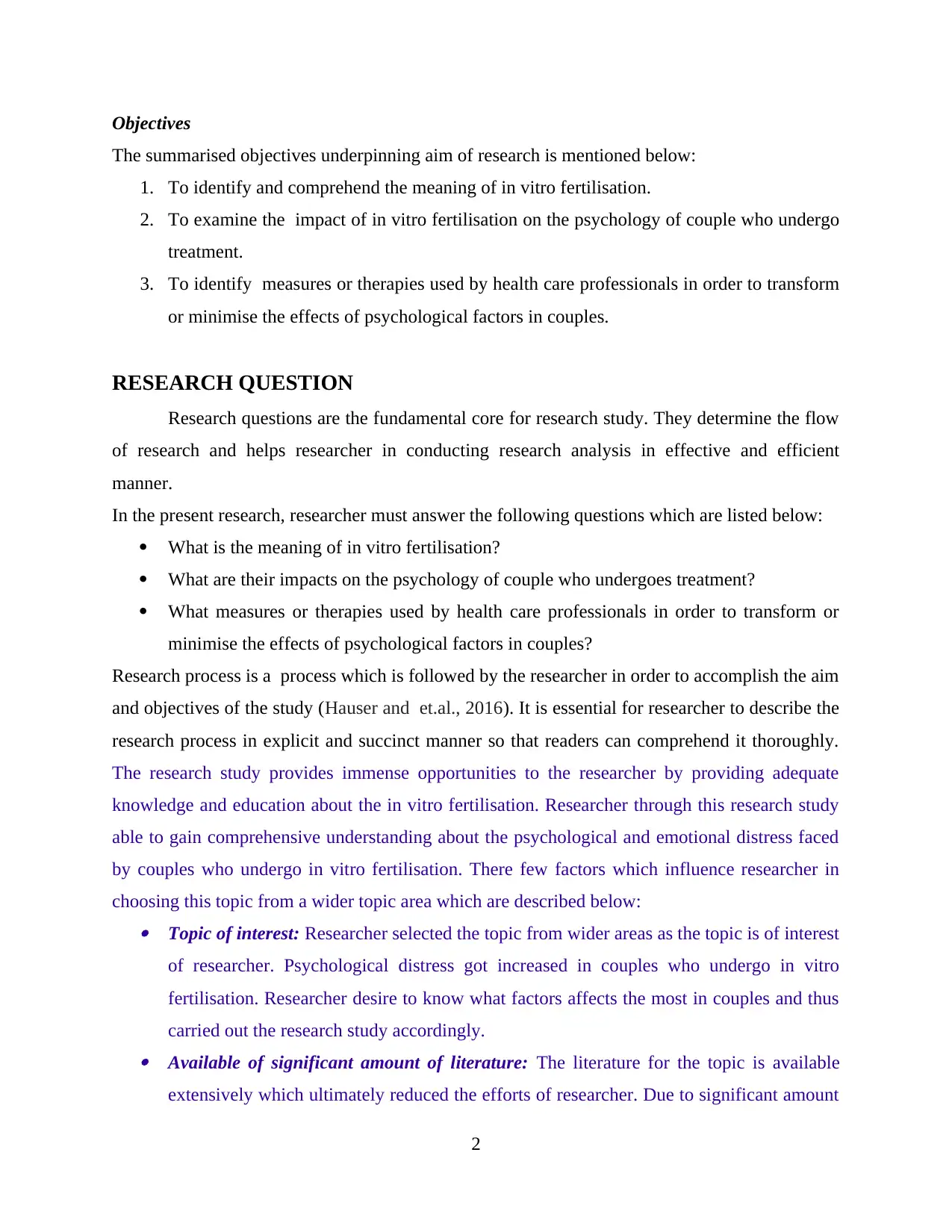
Objectives
The summarised objectives underpinning aim of research is mentioned below:
1. To identify and comprehend the meaning of in vitro fertilisation.
2. To examine the impact of in vitro fertilisation on the psychology of couple who undergo
treatment.
3. To identify measures or therapies used by health care professionals in order to transform
or minimise the effects of psychological factors in couples.
RESEARCH QUESTION
Research questions are the fundamental core for research study. They determine the flow
of research and helps researcher in conducting research analysis in effective and efficient
manner.
In the present research, researcher must answer the following questions which are listed below:
What is the meaning of in vitro fertilisation?
What are their impacts on the psychology of couple who undergoes treatment?
What measures or therapies used by health care professionals in order to transform or
minimise the effects of psychological factors in couples?
Research process is a process which is followed by the researcher in order to accomplish the aim
and objectives of the study (Hauser and et.al., 2016). It is essential for researcher to describe the
research process in explicit and succinct manner so that readers can comprehend it thoroughly.
The research study provides immense opportunities to the researcher by providing adequate
knowledge and education about the in vitro fertilisation. Researcher through this research study
able to gain comprehensive understanding about the psychological and emotional distress faced
by couples who undergo in vitro fertilisation. There few factors which influence researcher in
choosing this topic from a wider topic area which are described below: Topic of interest: Researcher selected the topic from wider areas as the topic is of interest
of researcher. Psychological distress got increased in couples who undergo in vitro
fertilisation. Researcher desire to know what factors affects the most in couples and thus
carried out the research study accordingly. Available of significant amount of literature: The literature for the topic is available
extensively which ultimately reduced the efforts of researcher. Due to significant amount
2
The summarised objectives underpinning aim of research is mentioned below:
1. To identify and comprehend the meaning of in vitro fertilisation.
2. To examine the impact of in vitro fertilisation on the psychology of couple who undergo
treatment.
3. To identify measures or therapies used by health care professionals in order to transform
or minimise the effects of psychological factors in couples.
RESEARCH QUESTION
Research questions are the fundamental core for research study. They determine the flow
of research and helps researcher in conducting research analysis in effective and efficient
manner.
In the present research, researcher must answer the following questions which are listed below:
What is the meaning of in vitro fertilisation?
What are their impacts on the psychology of couple who undergoes treatment?
What measures or therapies used by health care professionals in order to transform or
minimise the effects of psychological factors in couples?
Research process is a process which is followed by the researcher in order to accomplish the aim
and objectives of the study (Hauser and et.al., 2016). It is essential for researcher to describe the
research process in explicit and succinct manner so that readers can comprehend it thoroughly.
The research study provides immense opportunities to the researcher by providing adequate
knowledge and education about the in vitro fertilisation. Researcher through this research study
able to gain comprehensive understanding about the psychological and emotional distress faced
by couples who undergo in vitro fertilisation. There few factors which influence researcher in
choosing this topic from a wider topic area which are described below: Topic of interest: Researcher selected the topic from wider areas as the topic is of interest
of researcher. Psychological distress got increased in couples who undergo in vitro
fertilisation. Researcher desire to know what factors affects the most in couples and thus
carried out the research study accordingly. Available of significant amount of literature: The literature for the topic is available
extensively which ultimately reduced the efforts of researcher. Due to significant amount
2
Secure Best Marks with AI Grader
Need help grading? Try our AI Grader for instant feedback on your assignments.
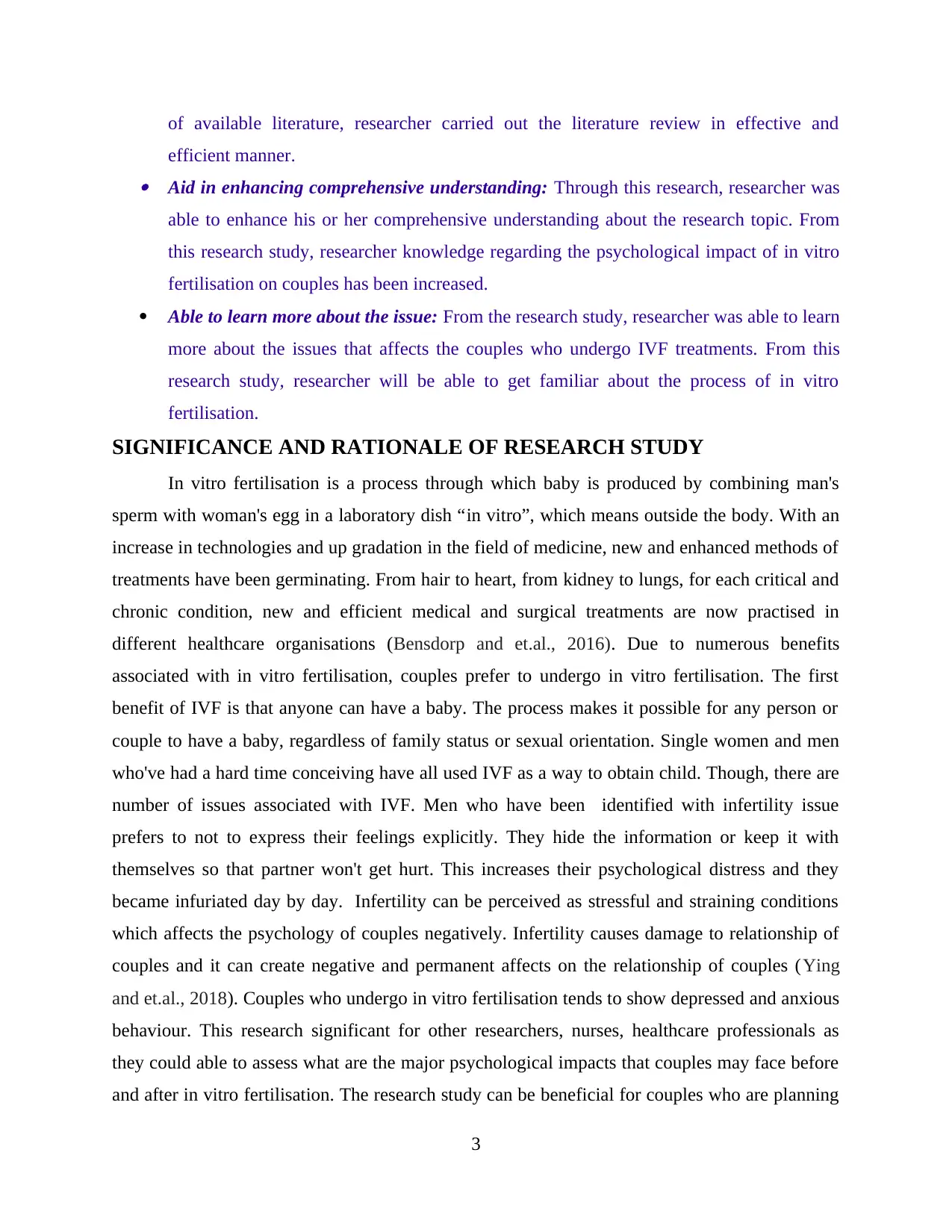
of available literature, researcher carried out the literature review in effective and
efficient manner. Aid in enhancing comprehensive understanding: Through this research, researcher was
able to enhance his or her comprehensive understanding about the research topic. From
this research study, researcher knowledge regarding the psychological impact of in vitro
fertilisation on couples has been increased.
Able to learn more about the issue: From the research study, researcher was able to learn
more about the issues that affects the couples who undergo IVF treatments. From this
research study, researcher will be able to get familiar about the process of in vitro
fertilisation.
SIGNIFICANCE AND RATIONALE OF RESEARCH STUDY
In vitro fertilisation is a process through which baby is produced by combining man's
sperm with woman's egg in a laboratory dish “in vitro”, which means outside the body. With an
increase in technologies and up gradation in the field of medicine, new and enhanced methods of
treatments have been germinating. From hair to heart, from kidney to lungs, for each critical and
chronic condition, new and efficient medical and surgical treatments are now practised in
different healthcare organisations (Bensdorp and et.al., 2016). Due to numerous benefits
associated with in vitro fertilisation, couples prefer to undergo in vitro fertilisation. The first
benefit of IVF is that anyone can have a baby. The process makes it possible for any person or
couple to have a baby, regardless of family status or sexual orientation. Single women and men
who've had a hard time conceiving have all used IVF as a way to obtain child. Though, there are
number of issues associated with IVF. Men who have been identified with infertility issue
prefers to not to express their feelings explicitly. They hide the information or keep it with
themselves so that partner won't get hurt. This increases their psychological distress and they
became infuriated day by day. Infertility can be perceived as stressful and straining conditions
which affects the psychology of couples negatively. Infertility causes damage to relationship of
couples and it can create negative and permanent affects on the relationship of couples (Ying
and et.al., 2018). Couples who undergo in vitro fertilisation tends to show depressed and anxious
behaviour. This research significant for other researchers, nurses, healthcare professionals as
they could able to assess what are the major psychological impacts that couples may face before
and after in vitro fertilisation. The research study can be beneficial for couples who are planning
3
efficient manner. Aid in enhancing comprehensive understanding: Through this research, researcher was
able to enhance his or her comprehensive understanding about the research topic. From
this research study, researcher knowledge regarding the psychological impact of in vitro
fertilisation on couples has been increased.
Able to learn more about the issue: From the research study, researcher was able to learn
more about the issues that affects the couples who undergo IVF treatments. From this
research study, researcher will be able to get familiar about the process of in vitro
fertilisation.
SIGNIFICANCE AND RATIONALE OF RESEARCH STUDY
In vitro fertilisation is a process through which baby is produced by combining man's
sperm with woman's egg in a laboratory dish “in vitro”, which means outside the body. With an
increase in technologies and up gradation in the field of medicine, new and enhanced methods of
treatments have been germinating. From hair to heart, from kidney to lungs, for each critical and
chronic condition, new and efficient medical and surgical treatments are now practised in
different healthcare organisations (Bensdorp and et.al., 2016). Due to numerous benefits
associated with in vitro fertilisation, couples prefer to undergo in vitro fertilisation. The first
benefit of IVF is that anyone can have a baby. The process makes it possible for any person or
couple to have a baby, regardless of family status or sexual orientation. Single women and men
who've had a hard time conceiving have all used IVF as a way to obtain child. Though, there are
number of issues associated with IVF. Men who have been identified with infertility issue
prefers to not to express their feelings explicitly. They hide the information or keep it with
themselves so that partner won't get hurt. This increases their psychological distress and they
became infuriated day by day. Infertility can be perceived as stressful and straining conditions
which affects the psychology of couples negatively. Infertility causes damage to relationship of
couples and it can create negative and permanent affects on the relationship of couples (Ying
and et.al., 2018). Couples who undergo in vitro fertilisation tends to show depressed and anxious
behaviour. This research significant for other researchers, nurses, healthcare professionals as
they could able to assess what are the major psychological impacts that couples may face before
and after in vitro fertilisation. The research study can be beneficial for couples who are planning
3
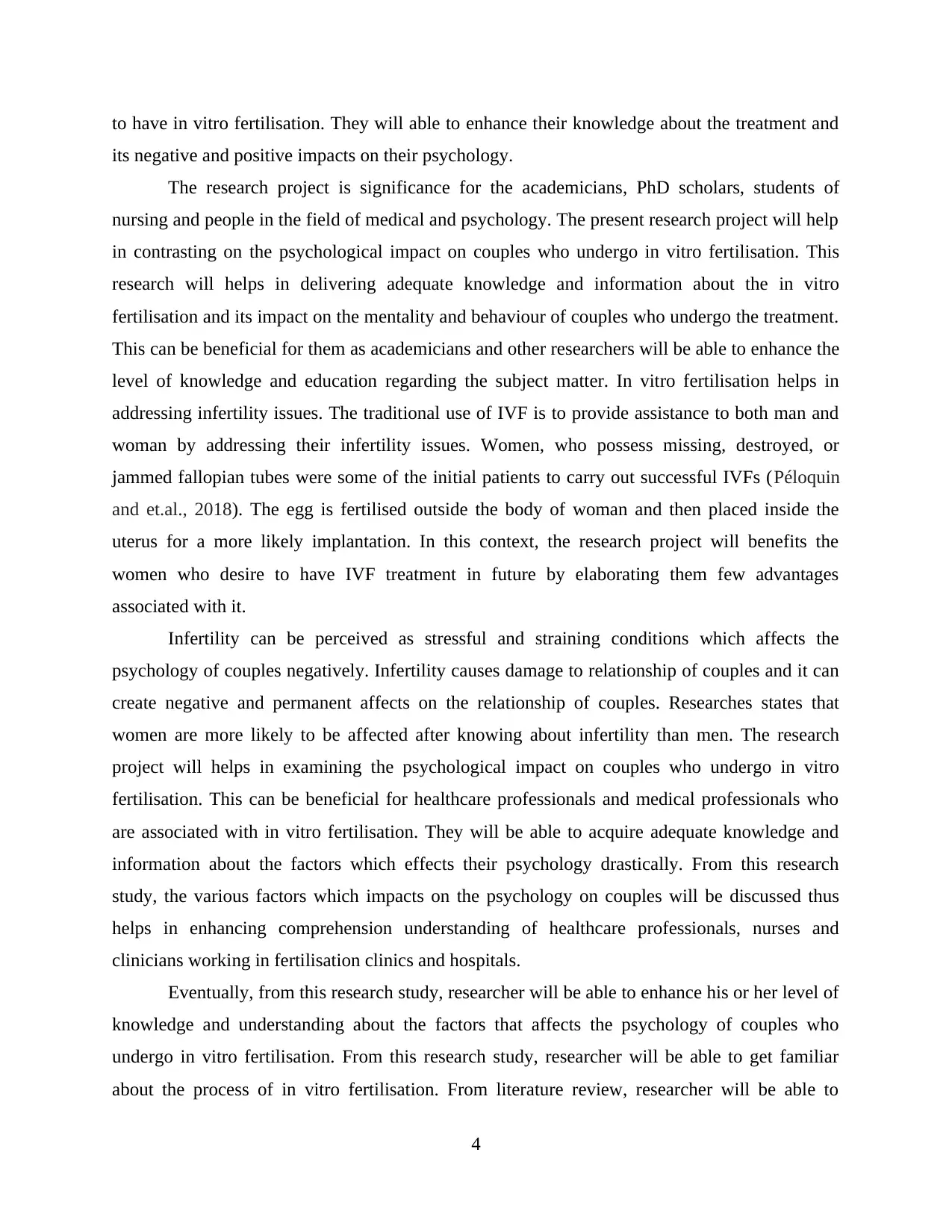
to have in vitro fertilisation. They will able to enhance their knowledge about the treatment and
its negative and positive impacts on their psychology.
The research project is significance for the academicians, PhD scholars, students of
nursing and people in the field of medical and psychology. The present research project will help
in contrasting on the psychological impact on couples who undergo in vitro fertilisation. This
research will helps in delivering adequate knowledge and information about the in vitro
fertilisation and its impact on the mentality and behaviour of couples who undergo the treatment.
This can be beneficial for them as academicians and other researchers will be able to enhance the
level of knowledge and education regarding the subject matter. In vitro fertilisation helps in
addressing infertility issues. The traditional use of IVF is to provide assistance to both man and
woman by addressing their infertility issues. Women, who possess missing, destroyed, or
jammed fallopian tubes were some of the initial patients to carry out successful IVFs (Péloquin
and et.al., 2018). The egg is fertilised outside the body of woman and then placed inside the
uterus for a more likely implantation. In this context, the research project will benefits the
women who desire to have IVF treatment in future by elaborating them few advantages
associated with it.
Infertility can be perceived as stressful and straining conditions which affects the
psychology of couples negatively. Infertility causes damage to relationship of couples and it can
create negative and permanent affects on the relationship of couples. Researches states that
women are more likely to be affected after knowing about infertility than men. The research
project will helps in examining the psychological impact on couples who undergo in vitro
fertilisation. This can be beneficial for healthcare professionals and medical professionals who
are associated with in vitro fertilisation. They will be able to acquire adequate knowledge and
information about the factors which effects their psychology drastically. From this research
study, the various factors which impacts on the psychology on couples will be discussed thus
helps in enhancing comprehension understanding of healthcare professionals, nurses and
clinicians working in fertilisation clinics and hospitals.
Eventually, from this research study, researcher will be able to enhance his or her level of
knowledge and understanding about the factors that affects the psychology of couples who
undergo in vitro fertilisation. From this research study, researcher will be able to get familiar
about the process of in vitro fertilisation. From literature review, researcher will be able to
4
its negative and positive impacts on their psychology.
The research project is significance for the academicians, PhD scholars, students of
nursing and people in the field of medical and psychology. The present research project will help
in contrasting on the psychological impact on couples who undergo in vitro fertilisation. This
research will helps in delivering adequate knowledge and information about the in vitro
fertilisation and its impact on the mentality and behaviour of couples who undergo the treatment.
This can be beneficial for them as academicians and other researchers will be able to enhance the
level of knowledge and education regarding the subject matter. In vitro fertilisation helps in
addressing infertility issues. The traditional use of IVF is to provide assistance to both man and
woman by addressing their infertility issues. Women, who possess missing, destroyed, or
jammed fallopian tubes were some of the initial patients to carry out successful IVFs (Péloquin
and et.al., 2018). The egg is fertilised outside the body of woman and then placed inside the
uterus for a more likely implantation. In this context, the research project will benefits the
women who desire to have IVF treatment in future by elaborating them few advantages
associated with it.
Infertility can be perceived as stressful and straining conditions which affects the
psychology of couples negatively. Infertility causes damage to relationship of couples and it can
create negative and permanent affects on the relationship of couples. Researches states that
women are more likely to be affected after knowing about infertility than men. The research
project will helps in examining the psychological impact on couples who undergo in vitro
fertilisation. This can be beneficial for healthcare professionals and medical professionals who
are associated with in vitro fertilisation. They will be able to acquire adequate knowledge and
information about the factors which effects their psychology drastically. From this research
study, the various factors which impacts on the psychology on couples will be discussed thus
helps in enhancing comprehension understanding of healthcare professionals, nurses and
clinicians working in fertilisation clinics and hospitals.
Eventually, from this research study, researcher will be able to enhance his or her level of
knowledge and understanding about the factors that affects the psychology of couples who
undergo in vitro fertilisation. From this research study, researcher will be able to get familiar
about the process of in vitro fertilisation. From literature review, researcher will be able to
4
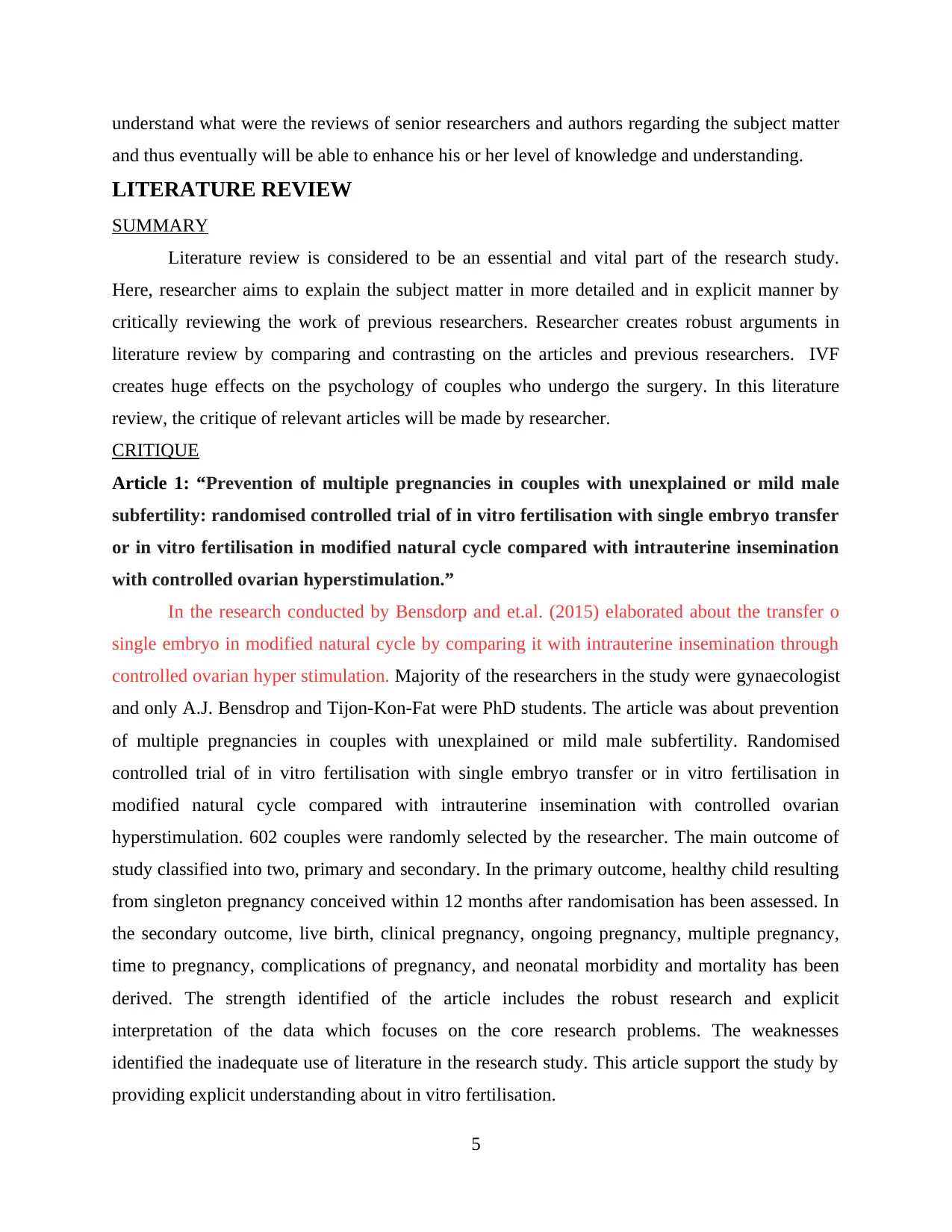
understand what were the reviews of senior researchers and authors regarding the subject matter
and thus eventually will be able to enhance his or her level of knowledge and understanding.
LITERATURE REVIEW
SUMMARY
Literature review is considered to be an essential and vital part of the research study.
Here, researcher aims to explain the subject matter in more detailed and in explicit manner by
critically reviewing the work of previous researchers. Researcher creates robust arguments in
literature review by comparing and contrasting on the articles and previous researchers. IVF
creates huge effects on the psychology of couples who undergo the surgery. In this literature
review, the critique of relevant articles will be made by researcher.
CRITIQUE
Article 1: “Prevention of multiple pregnancies in couples with unexplained or mild male
subfertility: randomised controlled trial of in vitro fertilisation with single embryo transfer
or in vitro fertilisation in modified natural cycle compared with intrauterine insemination
with controlled ovarian hyperstimulation.”
In the research conducted by Bensdorp and et.al. (2015) elaborated about the transfer o
single embryo in modified natural cycle by comparing it with intrauterine insemination through
controlled ovarian hyper stimulation. Majority of the researchers in the study were gynaecologist
and only A.J. Bensdrop and Tijon-Kon-Fat were PhD students. The article was about prevention
of multiple pregnancies in couples with unexplained or mild male subfertility. Randomised
controlled trial of in vitro fertilisation with single embryo transfer or in vitro fertilisation in
modified natural cycle compared with intrauterine insemination with controlled ovarian
hyperstimulation. 602 couples were randomly selected by the researcher. The main outcome of
study classified into two, primary and secondary. In the primary outcome, healthy child resulting
from singleton pregnancy conceived within 12 months after randomisation has been assessed. In
the secondary outcome, live birth, clinical pregnancy, ongoing pregnancy, multiple pregnancy,
time to pregnancy, complications of pregnancy, and neonatal morbidity and mortality has been
derived. The strength identified of the article includes the robust research and explicit
interpretation of the data which focuses on the core research problems. The weaknesses
identified the inadequate use of literature in the research study. This article support the study by
providing explicit understanding about in vitro fertilisation.
5
and thus eventually will be able to enhance his or her level of knowledge and understanding.
LITERATURE REVIEW
SUMMARY
Literature review is considered to be an essential and vital part of the research study.
Here, researcher aims to explain the subject matter in more detailed and in explicit manner by
critically reviewing the work of previous researchers. Researcher creates robust arguments in
literature review by comparing and contrasting on the articles and previous researchers. IVF
creates huge effects on the psychology of couples who undergo the surgery. In this literature
review, the critique of relevant articles will be made by researcher.
CRITIQUE
Article 1: “Prevention of multiple pregnancies in couples with unexplained or mild male
subfertility: randomised controlled trial of in vitro fertilisation with single embryo transfer
or in vitro fertilisation in modified natural cycle compared with intrauterine insemination
with controlled ovarian hyperstimulation.”
In the research conducted by Bensdorp and et.al. (2015) elaborated about the transfer o
single embryo in modified natural cycle by comparing it with intrauterine insemination through
controlled ovarian hyper stimulation. Majority of the researchers in the study were gynaecologist
and only A.J. Bensdrop and Tijon-Kon-Fat were PhD students. The article was about prevention
of multiple pregnancies in couples with unexplained or mild male subfertility. Randomised
controlled trial of in vitro fertilisation with single embryo transfer or in vitro fertilisation in
modified natural cycle compared with intrauterine insemination with controlled ovarian
hyperstimulation. 602 couples were randomly selected by the researcher. The main outcome of
study classified into two, primary and secondary. In the primary outcome, healthy child resulting
from singleton pregnancy conceived within 12 months after randomisation has been assessed. In
the secondary outcome, live birth, clinical pregnancy, ongoing pregnancy, multiple pregnancy,
time to pregnancy, complications of pregnancy, and neonatal morbidity and mortality has been
derived. The strength identified of the article includes the robust research and explicit
interpretation of the data which focuses on the core research problems. The weaknesses
identified the inadequate use of literature in the research study. This article support the study by
providing explicit understanding about in vitro fertilisation.
5
Paraphrase This Document
Need a fresh take? Get an instant paraphrase of this document with our AI Paraphraser
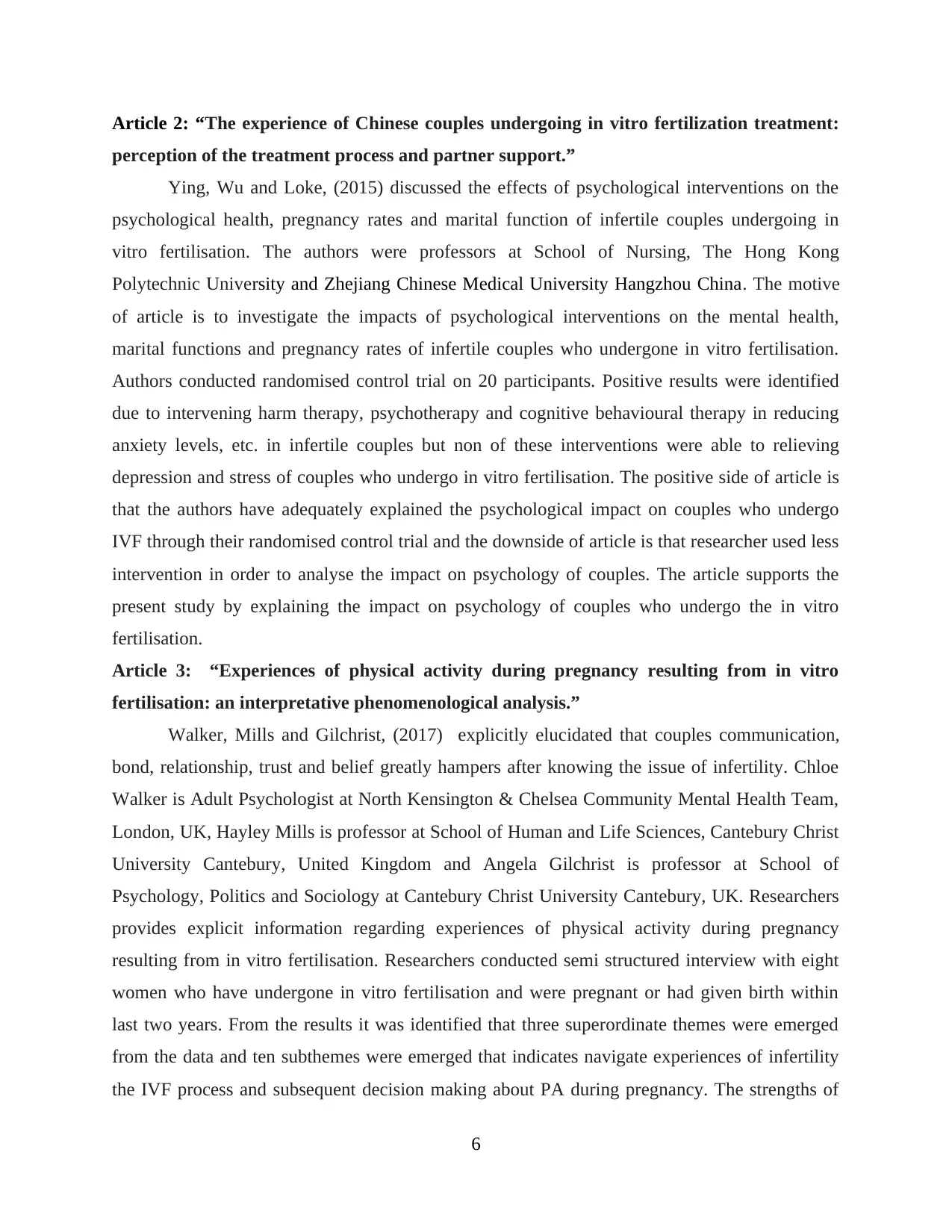
Article 2: “The experience of Chinese couples undergoing in vitro fertilization treatment:
perception of the treatment process and partner support.”
Ying, Wu and Loke, (2015) discussed the effects of psychological interventions on the
psychological health, pregnancy rates and marital function of infertile couples undergoing in
vitro fertilisation. The authors were professors at School of Nursing, The Hong Kong
Polytechnic University and Zhejiang Chinese Medical University Hangzhou China. The motive
of article is to investigate the impacts of psychological interventions on the mental health,
marital functions and pregnancy rates of infertile couples who undergone in vitro fertilisation.
Authors conducted randomised control trial on 20 participants. Positive results were identified
due to intervening harm therapy, psychotherapy and cognitive behavioural therapy in reducing
anxiety levels, etc. in infertile couples but non of these interventions were able to relieving
depression and stress of couples who undergo in vitro fertilisation. The positive side of article is
that the authors have adequately explained the psychological impact on couples who undergo
IVF through their randomised control trial and the downside of article is that researcher used less
intervention in order to analyse the impact on psychology of couples. The article supports the
present study by explaining the impact on psychology of couples who undergo the in vitro
fertilisation.
Article 3: “Experiences of physical activity during pregnancy resulting from in vitro
fertilisation: an interpretative phenomenological analysis.”
Walker, Mills and Gilchrist, (2017) explicitly elucidated that couples communication,
bond, relationship, trust and belief greatly hampers after knowing the issue of infertility. Chloe
Walker is Adult Psychologist at North Kensington & Chelsea Community Mental Health Team,
London, UK, Hayley Mills is professor at School of Human and Life Sciences, Cantebury Christ
University Cantebury, United Kingdom and Angela Gilchrist is professor at School of
Psychology, Politics and Sociology at Cantebury Christ University Cantebury, UK. Researchers
provides explicit information regarding experiences of physical activity during pregnancy
resulting from in vitro fertilisation. Researchers conducted semi structured interview with eight
women who have undergone in vitro fertilisation and were pregnant or had given birth within
last two years. From the results it was identified that three superordinate themes were emerged
from the data and ten subthemes were emerged that indicates navigate experiences of infertility
the IVF process and subsequent decision making about PA during pregnancy. The strengths of
6
perception of the treatment process and partner support.”
Ying, Wu and Loke, (2015) discussed the effects of psychological interventions on the
psychological health, pregnancy rates and marital function of infertile couples undergoing in
vitro fertilisation. The authors were professors at School of Nursing, The Hong Kong
Polytechnic University and Zhejiang Chinese Medical University Hangzhou China. The motive
of article is to investigate the impacts of psychological interventions on the mental health,
marital functions and pregnancy rates of infertile couples who undergone in vitro fertilisation.
Authors conducted randomised control trial on 20 participants. Positive results were identified
due to intervening harm therapy, psychotherapy and cognitive behavioural therapy in reducing
anxiety levels, etc. in infertile couples but non of these interventions were able to relieving
depression and stress of couples who undergo in vitro fertilisation. The positive side of article is
that the authors have adequately explained the psychological impact on couples who undergo
IVF through their randomised control trial and the downside of article is that researcher used less
intervention in order to analyse the impact on psychology of couples. The article supports the
present study by explaining the impact on psychology of couples who undergo the in vitro
fertilisation.
Article 3: “Experiences of physical activity during pregnancy resulting from in vitro
fertilisation: an interpretative phenomenological analysis.”
Walker, Mills and Gilchrist, (2017) explicitly elucidated that couples communication,
bond, relationship, trust and belief greatly hampers after knowing the issue of infertility. Chloe
Walker is Adult Psychologist at North Kensington & Chelsea Community Mental Health Team,
London, UK, Hayley Mills is professor at School of Human and Life Sciences, Cantebury Christ
University Cantebury, United Kingdom and Angela Gilchrist is professor at School of
Psychology, Politics and Sociology at Cantebury Christ University Cantebury, UK. Researchers
provides explicit information regarding experiences of physical activity during pregnancy
resulting from in vitro fertilisation. Researchers conducted semi structured interview with eight
women who have undergone in vitro fertilisation and were pregnant or had given birth within
last two years. From the results it was identified that three superordinate themes were emerged
from the data and ten subthemes were emerged that indicates navigate experiences of infertility
the IVF process and subsequent decision making about PA during pregnancy. The strengths of
6
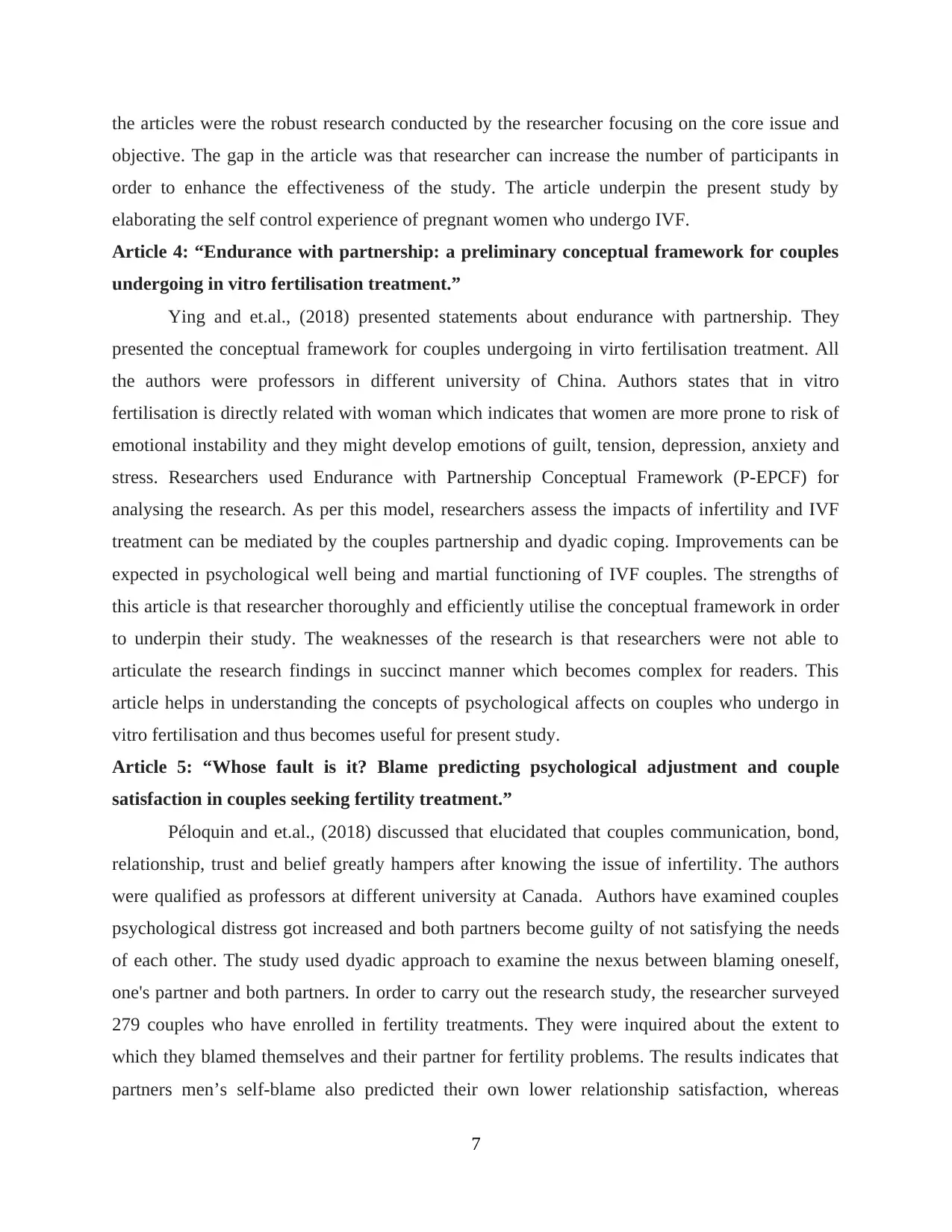
the articles were the robust research conducted by the researcher focusing on the core issue and
objective. The gap in the article was that researcher can increase the number of participants in
order to enhance the effectiveness of the study. The article underpin the present study by
elaborating the self control experience of pregnant women who undergo IVF.
Article 4: “Endurance with partnership: a preliminary conceptual framework for couples
undergoing in vitro fertilisation treatment.”
Ying and et.al., (2018) presented statements about endurance with partnership. They
presented the conceptual framework for couples undergoing in virto fertilisation treatment. All
the authors were professors in different university of China. Authors states that in vitro
fertilisation is directly related with woman which indicates that women are more prone to risk of
emotional instability and they might develop emotions of guilt, tension, depression, anxiety and
stress. Researchers used Endurance with Partnership Conceptual Framework (P-EPCF) for
analysing the research. As per this model, researchers assess the impacts of infertility and IVF
treatment can be mediated by the couples partnership and dyadic coping. Improvements can be
expected in psychological well being and martial functioning of IVF couples. The strengths of
this article is that researcher thoroughly and efficiently utilise the conceptual framework in order
to underpin their study. The weaknesses of the research is that researchers were not able to
articulate the research findings in succinct manner which becomes complex for readers. This
article helps in understanding the concepts of psychological affects on couples who undergo in
vitro fertilisation and thus becomes useful for present study.
Article 5: “Whose fault is it? Blame predicting psychological adjustment and couple
satisfaction in couples seeking fertility treatment.”
Péloquin and et.al., (2018) discussed that elucidated that couples communication, bond,
relationship, trust and belief greatly hampers after knowing the issue of infertility. The authors
were qualified as professors at different university at Canada. Authors have examined couples
psychological distress got increased and both partners become guilty of not satisfying the needs
of each other. The study used dyadic approach to examine the nexus between blaming oneself,
one's partner and both partners. In order to carry out the research study, the researcher surveyed
279 couples who have enrolled in fertility treatments. They were inquired about the extent to
which they blamed themselves and their partner for fertility problems. The results indicates that
partners men’s self-blame also predicted their own lower relationship satisfaction, whereas
7
objective. The gap in the article was that researcher can increase the number of participants in
order to enhance the effectiveness of the study. The article underpin the present study by
elaborating the self control experience of pregnant women who undergo IVF.
Article 4: “Endurance with partnership: a preliminary conceptual framework for couples
undergoing in vitro fertilisation treatment.”
Ying and et.al., (2018) presented statements about endurance with partnership. They
presented the conceptual framework for couples undergoing in virto fertilisation treatment. All
the authors were professors in different university of China. Authors states that in vitro
fertilisation is directly related with woman which indicates that women are more prone to risk of
emotional instability and they might develop emotions of guilt, tension, depression, anxiety and
stress. Researchers used Endurance with Partnership Conceptual Framework (P-EPCF) for
analysing the research. As per this model, researchers assess the impacts of infertility and IVF
treatment can be mediated by the couples partnership and dyadic coping. Improvements can be
expected in psychological well being and martial functioning of IVF couples. The strengths of
this article is that researcher thoroughly and efficiently utilise the conceptual framework in order
to underpin their study. The weaknesses of the research is that researchers were not able to
articulate the research findings in succinct manner which becomes complex for readers. This
article helps in understanding the concepts of psychological affects on couples who undergo in
vitro fertilisation and thus becomes useful for present study.
Article 5: “Whose fault is it? Blame predicting psychological adjustment and couple
satisfaction in couples seeking fertility treatment.”
Péloquin and et.al., (2018) discussed that elucidated that couples communication, bond,
relationship, trust and belief greatly hampers after knowing the issue of infertility. The authors
were qualified as professors at different university at Canada. Authors have examined couples
psychological distress got increased and both partners become guilty of not satisfying the needs
of each other. The study used dyadic approach to examine the nexus between blaming oneself,
one's partner and both partners. In order to carry out the research study, the researcher surveyed
279 couples who have enrolled in fertility treatments. They were inquired about the extent to
which they blamed themselves and their partner for fertility problems. The results indicates that
partners men’s self-blame also predicted their own lower relationship satisfaction, whereas
7
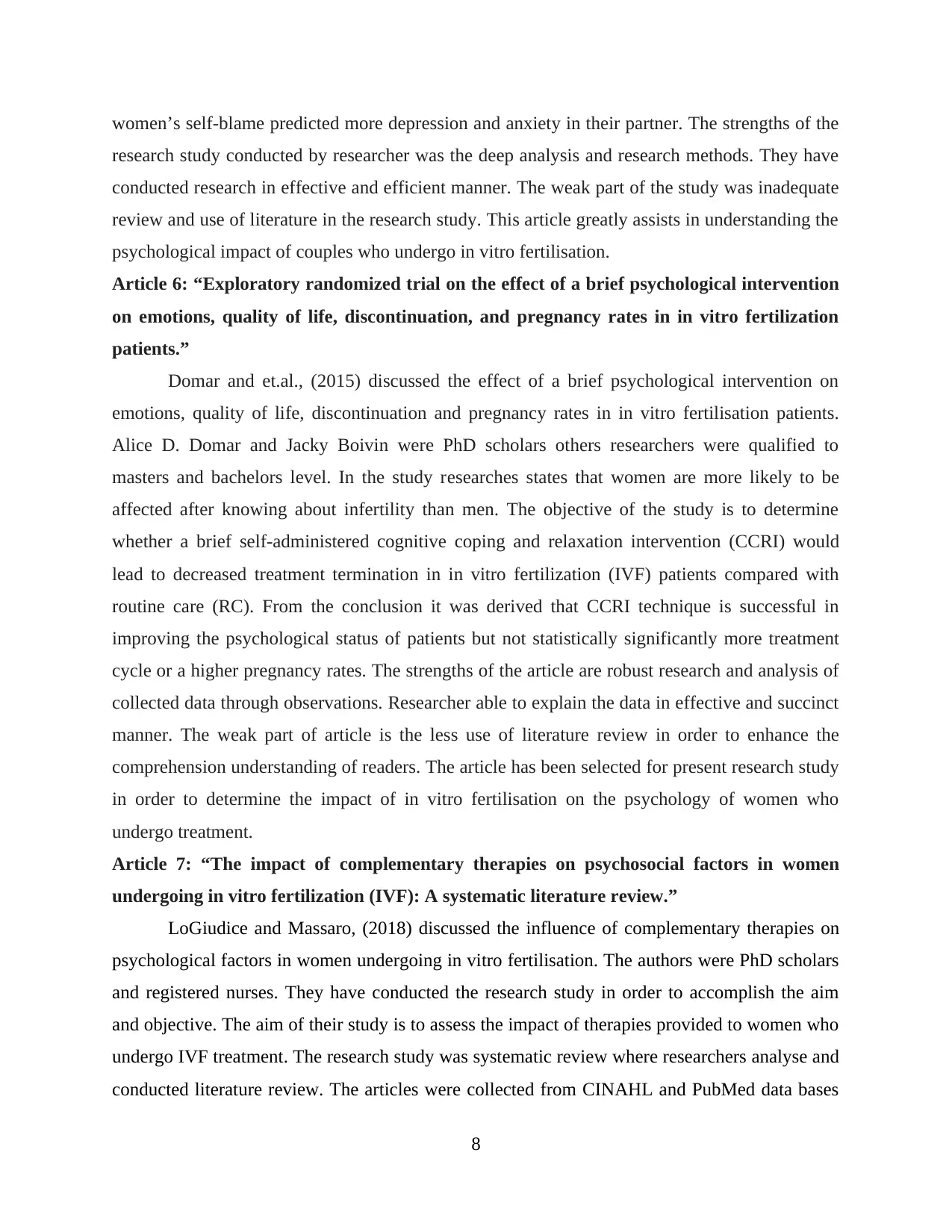
women’s self-blame predicted more depression and anxiety in their partner. The strengths of the
research study conducted by researcher was the deep analysis and research methods. They have
conducted research in effective and efficient manner. The weak part of the study was inadequate
review and use of literature in the research study. This article greatly assists in understanding the
psychological impact of couples who undergo in vitro fertilisation.
Article 6: “Exploratory randomized trial on the effect of a brief psychological intervention
on emotions, quality of life, discontinuation, and pregnancy rates in in vitro fertilization
patients.”
Domar and et.al., (2015) discussed the effect of a brief psychological intervention on
emotions, quality of life, discontinuation and pregnancy rates in in vitro fertilisation patients.
Alice D. Domar and Jacky Boivin were PhD scholars others researchers were qualified to
masters and bachelors level. In the study researches states that women are more likely to be
affected after knowing about infertility than men. The objective of the study is to determine
whether a brief self-administered cognitive coping and relaxation intervention (CCRI) would
lead to decreased treatment termination in in vitro fertilization (IVF) patients compared with
routine care (RC). From the conclusion it was derived that CCRI technique is successful in
improving the psychological status of patients but not statistically significantly more treatment
cycle or a higher pregnancy rates. The strengths of the article are robust research and analysis of
collected data through observations. Researcher able to explain the data in effective and succinct
manner. The weak part of article is the less use of literature review in order to enhance the
comprehension understanding of readers. The article has been selected for present research study
in order to determine the impact of in vitro fertilisation on the psychology of women who
undergo treatment.
Article 7: “The impact of complementary therapies on psychosocial factors in women
undergoing in vitro fertilization (IVF): A systematic literature review.”
LoGiudice and Massaro, (2018) discussed the influence of complementary therapies on
psychological factors in women undergoing in vitro fertilisation. The authors were PhD scholars
and registered nurses. They have conducted the research study in order to accomplish the aim
and objective. The aim of their study is to assess the impact of therapies provided to women who
undergo IVF treatment. The research study was systematic review where researchers analyse and
conducted literature review. The articles were collected from CINAHL and PubMed data bases
8
research study conducted by researcher was the deep analysis and research methods. They have
conducted research in effective and efficient manner. The weak part of the study was inadequate
review and use of literature in the research study. This article greatly assists in understanding the
psychological impact of couples who undergo in vitro fertilisation.
Article 6: “Exploratory randomized trial on the effect of a brief psychological intervention
on emotions, quality of life, discontinuation, and pregnancy rates in in vitro fertilization
patients.”
Domar and et.al., (2015) discussed the effect of a brief psychological intervention on
emotions, quality of life, discontinuation and pregnancy rates in in vitro fertilisation patients.
Alice D. Domar and Jacky Boivin were PhD scholars others researchers were qualified to
masters and bachelors level. In the study researches states that women are more likely to be
affected after knowing about infertility than men. The objective of the study is to determine
whether a brief self-administered cognitive coping and relaxation intervention (CCRI) would
lead to decreased treatment termination in in vitro fertilization (IVF) patients compared with
routine care (RC). From the conclusion it was derived that CCRI technique is successful in
improving the psychological status of patients but not statistically significantly more treatment
cycle or a higher pregnancy rates. The strengths of the article are robust research and analysis of
collected data through observations. Researcher able to explain the data in effective and succinct
manner. The weak part of article is the less use of literature review in order to enhance the
comprehension understanding of readers. The article has been selected for present research study
in order to determine the impact of in vitro fertilisation on the psychology of women who
undergo treatment.
Article 7: “The impact of complementary therapies on psychosocial factors in women
undergoing in vitro fertilization (IVF): A systematic literature review.”
LoGiudice and Massaro, (2018) discussed the influence of complementary therapies on
psychological factors in women undergoing in vitro fertilisation. The authors were PhD scholars
and registered nurses. They have conducted the research study in order to accomplish the aim
and objective. The aim of their study is to assess the impact of therapies provided to women who
undergo IVF treatment. The research study was systematic review where researchers analyse and
conducted literature review. The articles were collected from CINAHL and PubMed data bases
8
Secure Best Marks with AI Grader
Need help grading? Try our AI Grader for instant feedback on your assignments.
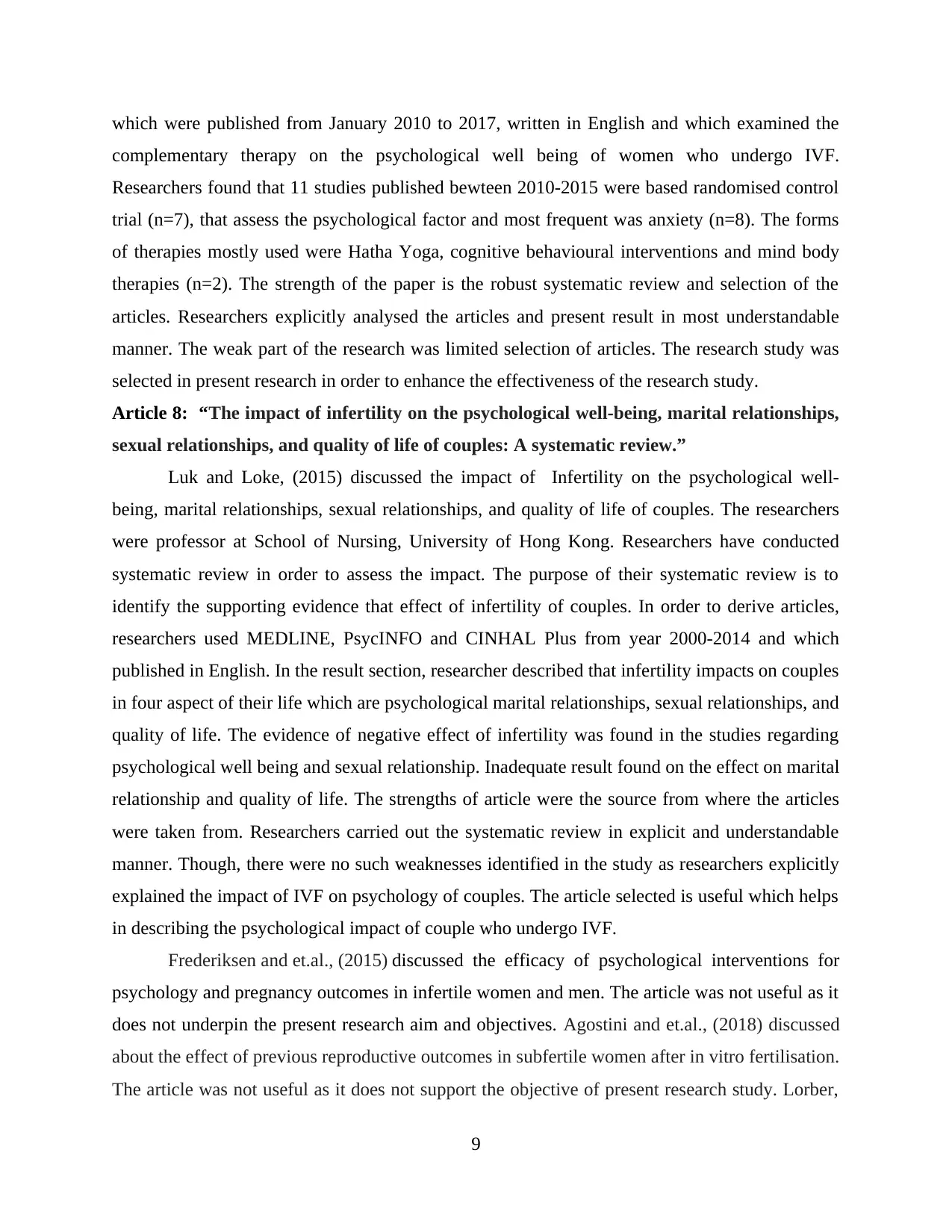
which were published from January 2010 to 2017, written in English and which examined the
complementary therapy on the psychological well being of women who undergo IVF.
Researchers found that 11 studies published bewteen 2010-2015 were based randomised control
trial (n=7), that assess the psychological factor and most frequent was anxiety (n=8). The forms
of therapies mostly used were Hatha Yoga, cognitive behavioural interventions and mind body
therapies (n=2). The strength of the paper is the robust systematic review and selection of the
articles. Researchers explicitly analysed the articles and present result in most understandable
manner. The weak part of the research was limited selection of articles. The research study was
selected in present research in order to enhance the effectiveness of the research study.
Article 8: “The impact of infertility on the psychological well-being, marital relationships,
sexual relationships, and quality of life of couples: A systematic review.”
Luk and Loke, (2015) discussed the impact of Infertility on the psychological well-
being, marital relationships, sexual relationships, and quality of life of couples. The researchers
were professor at School of Nursing, University of Hong Kong. Researchers have conducted
systematic review in order to assess the impact. The purpose of their systematic review is to
identify the supporting evidence that effect of infertility of couples. In order to derive articles,
researchers used MEDLINE, PsycINFO and CINHAL Plus from year 2000-2014 and which
published in English. In the result section, researcher described that infertility impacts on couples
in four aspect of their life which are psychological marital relationships, sexual relationships, and
quality of life. The evidence of negative effect of infertility was found in the studies regarding
psychological well being and sexual relationship. Inadequate result found on the effect on marital
relationship and quality of life. The strengths of article were the source from where the articles
were taken from. Researchers carried out the systematic review in explicit and understandable
manner. Though, there were no such weaknesses identified in the study as researchers explicitly
explained the impact of IVF on psychology of couples. The article selected is useful which helps
in describing the psychological impact of couple who undergo IVF.
Frederiksen and et.al., (2015) discussed the efficacy of psychological interventions for
psychology and pregnancy outcomes in infertile women and men. The article was not useful as it
does not underpin the present research aim and objectives. Agostini and et.al., (2018) discussed
about the effect of previous reproductive outcomes in subfertile women after in vitro fertilisation.
The article was not useful as it does not support the objective of present research study. Lorber,
9
complementary therapy on the psychological well being of women who undergo IVF.
Researchers found that 11 studies published bewteen 2010-2015 were based randomised control
trial (n=7), that assess the psychological factor and most frequent was anxiety (n=8). The forms
of therapies mostly used were Hatha Yoga, cognitive behavioural interventions and mind body
therapies (n=2). The strength of the paper is the robust systematic review and selection of the
articles. Researchers explicitly analysed the articles and present result in most understandable
manner. The weak part of the research was limited selection of articles. The research study was
selected in present research in order to enhance the effectiveness of the research study.
Article 8: “The impact of infertility on the psychological well-being, marital relationships,
sexual relationships, and quality of life of couples: A systematic review.”
Luk and Loke, (2015) discussed the impact of Infertility on the psychological well-
being, marital relationships, sexual relationships, and quality of life of couples. The researchers
were professor at School of Nursing, University of Hong Kong. Researchers have conducted
systematic review in order to assess the impact. The purpose of their systematic review is to
identify the supporting evidence that effect of infertility of couples. In order to derive articles,
researchers used MEDLINE, PsycINFO and CINHAL Plus from year 2000-2014 and which
published in English. In the result section, researcher described that infertility impacts on couples
in four aspect of their life which are psychological marital relationships, sexual relationships, and
quality of life. The evidence of negative effect of infertility was found in the studies regarding
psychological well being and sexual relationship. Inadequate result found on the effect on marital
relationship and quality of life. The strengths of article were the source from where the articles
were taken from. Researchers carried out the systematic review in explicit and understandable
manner. Though, there were no such weaknesses identified in the study as researchers explicitly
explained the impact of IVF on psychology of couples. The article selected is useful which helps
in describing the psychological impact of couple who undergo IVF.
Frederiksen and et.al., (2015) discussed the efficacy of psychological interventions for
psychology and pregnancy outcomes in infertile women and men. The article was not useful as it
does not underpin the present research aim and objectives. Agostini and et.al., (2018) discussed
about the effect of previous reproductive outcomes in subfertile women after in vitro fertilisation.
The article was not useful as it does not support the objective of present research study. Lorber,
9
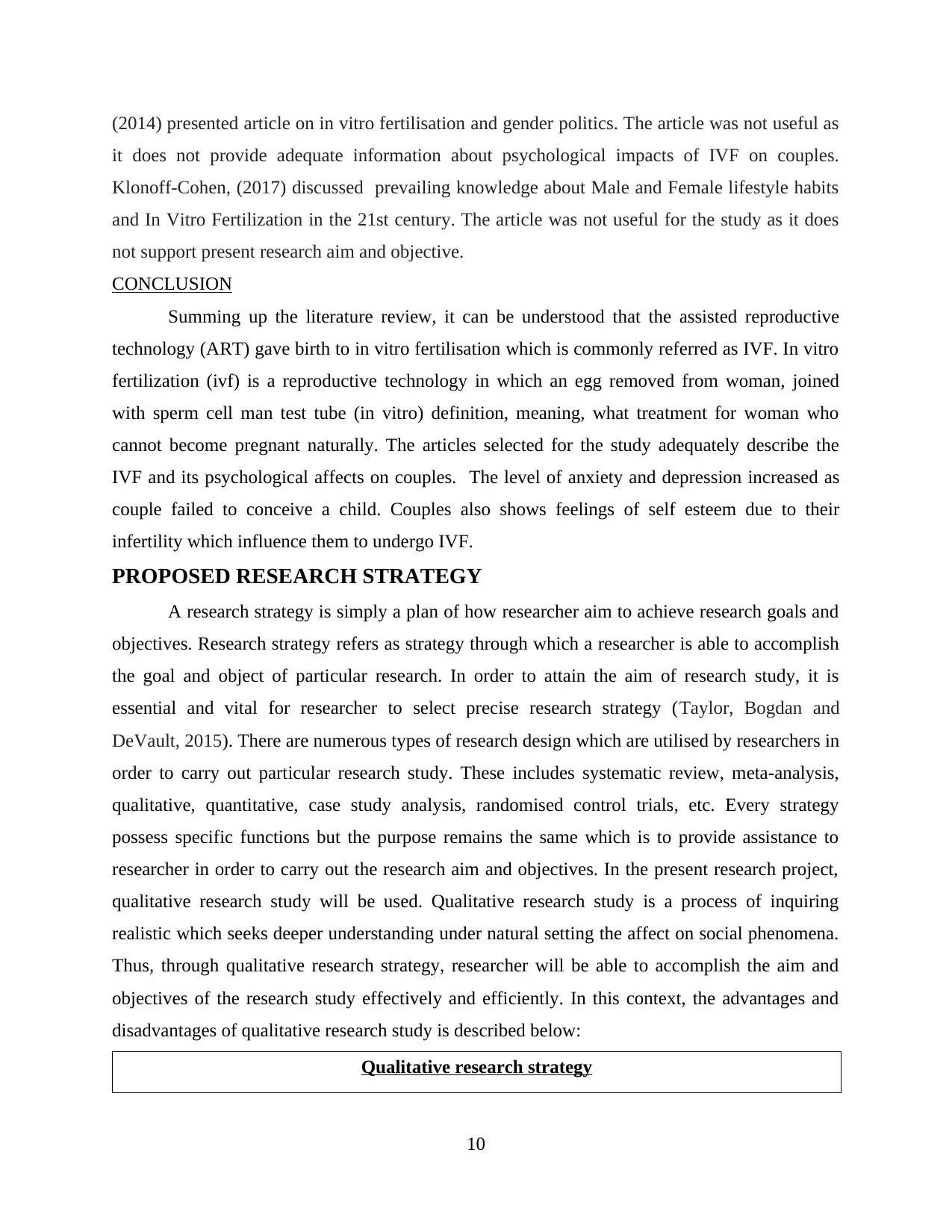
(2014) presented article on in vitro fertilisation and gender politics. The article was not useful as
it does not provide adequate information about psychological impacts of IVF on couples.
Klonoff-Cohen, (2017) discussed prevailing knowledge about Male and Female lifestyle habits
and In Vitro Fertilization in the 21st century. The article was not useful for the study as it does
not support present research aim and objective.
CONCLUSION
Summing up the literature review, it can be understood that the assisted reproductive
technology (ART) gave birth to in vitro fertilisation which is commonly referred as IVF. In vitro
fertilization (ivf) is a reproductive technology in which an egg removed from woman, joined
with sperm cell man test tube (in vitro) definition, meaning, what treatment for woman who
cannot become pregnant naturally. The articles selected for the study adequately describe the
IVF and its psychological affects on couples. The level of anxiety and depression increased as
couple failed to conceive a child. Couples also shows feelings of self esteem due to their
infertility which influence them to undergo IVF.
PROPOSED RESEARCH STRATEGY
A research strategy is simply a plan of how researcher aim to achieve research goals and
objectives. Research strategy refers as strategy through which a researcher is able to accomplish
the goal and object of particular research. In order to attain the aim of research study, it is
essential and vital for researcher to select precise research strategy (Taylor, Bogdan and
DeVault, 2015). There are numerous types of research design which are utilised by researchers in
order to carry out particular research study. These includes systematic review, meta-analysis,
qualitative, quantitative, case study analysis, randomised control trials, etc. Every strategy
possess specific functions but the purpose remains the same which is to provide assistance to
researcher in order to carry out the research aim and objectives. In the present research project,
qualitative research study will be used. Qualitative research study is a process of inquiring
realistic which seeks deeper understanding under natural setting the affect on social phenomena.
Thus, through qualitative research strategy, researcher will be able to accomplish the aim and
objectives of the research study effectively and efficiently. In this context, the advantages and
disadvantages of qualitative research study is described below:
Qualitative research strategy
10
it does not provide adequate information about psychological impacts of IVF on couples.
Klonoff-Cohen, (2017) discussed prevailing knowledge about Male and Female lifestyle habits
and In Vitro Fertilization in the 21st century. The article was not useful for the study as it does
not support present research aim and objective.
CONCLUSION
Summing up the literature review, it can be understood that the assisted reproductive
technology (ART) gave birth to in vitro fertilisation which is commonly referred as IVF. In vitro
fertilization (ivf) is a reproductive technology in which an egg removed from woman, joined
with sperm cell man test tube (in vitro) definition, meaning, what treatment for woman who
cannot become pregnant naturally. The articles selected for the study adequately describe the
IVF and its psychological affects on couples. The level of anxiety and depression increased as
couple failed to conceive a child. Couples also shows feelings of self esteem due to their
infertility which influence them to undergo IVF.
PROPOSED RESEARCH STRATEGY
A research strategy is simply a plan of how researcher aim to achieve research goals and
objectives. Research strategy refers as strategy through which a researcher is able to accomplish
the goal and object of particular research. In order to attain the aim of research study, it is
essential and vital for researcher to select precise research strategy (Taylor, Bogdan and
DeVault, 2015). There are numerous types of research design which are utilised by researchers in
order to carry out particular research study. These includes systematic review, meta-analysis,
qualitative, quantitative, case study analysis, randomised control trials, etc. Every strategy
possess specific functions but the purpose remains the same which is to provide assistance to
researcher in order to carry out the research aim and objectives. In the present research project,
qualitative research study will be used. Qualitative research study is a process of inquiring
realistic which seeks deeper understanding under natural setting the affect on social phenomena.
Thus, through qualitative research strategy, researcher will be able to accomplish the aim and
objectives of the research study effectively and efficiently. In this context, the advantages and
disadvantages of qualitative research study is described below:
Qualitative research strategy
10
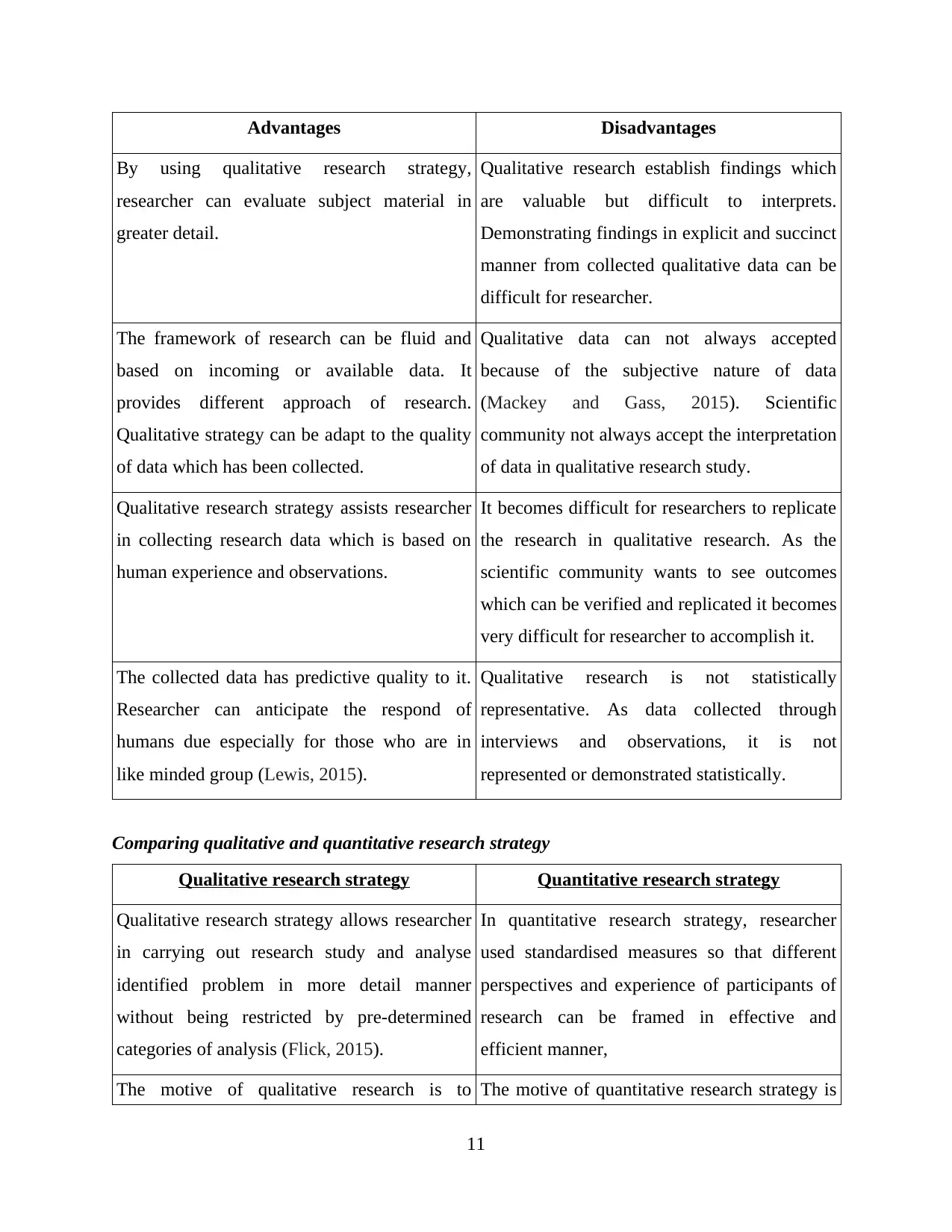
Advantages Disadvantages
By using qualitative research strategy,
researcher can evaluate subject material in
greater detail.
Qualitative research establish findings which
are valuable but difficult to interprets.
Demonstrating findings in explicit and succinct
manner from collected qualitative data can be
difficult for researcher.
The framework of research can be fluid and
based on incoming or available data. It
provides different approach of research.
Qualitative strategy can be adapt to the quality
of data which has been collected.
Qualitative data can not always accepted
because of the subjective nature of data
(Mackey and Gass, 2015). Scientific
community not always accept the interpretation
of data in qualitative research study.
Qualitative research strategy assists researcher
in collecting research data which is based on
human experience and observations.
It becomes difficult for researchers to replicate
the research in qualitative research. As the
scientific community wants to see outcomes
which can be verified and replicated it becomes
very difficult for researcher to accomplish it.
The collected data has predictive quality to it.
Researcher can anticipate the respond of
humans due especially for those who are in
like minded group (Lewis, 2015).
Qualitative research is not statistically
representative. As data collected through
interviews and observations, it is not
represented or demonstrated statistically.
Comparing qualitative and quantitative research strategy
Qualitative research strategy Quantitative research strategy
Qualitative research strategy allows researcher
in carrying out research study and analyse
identified problem in more detail manner
without being restricted by pre-determined
categories of analysis (Flick, 2015).
In quantitative research strategy, researcher
used standardised measures so that different
perspectives and experience of participants of
research can be framed in effective and
efficient manner,
The motive of qualitative research is to The motive of quantitative research strategy is
11
By using qualitative research strategy,
researcher can evaluate subject material in
greater detail.
Qualitative research establish findings which
are valuable but difficult to interprets.
Demonstrating findings in explicit and succinct
manner from collected qualitative data can be
difficult for researcher.
The framework of research can be fluid and
based on incoming or available data. It
provides different approach of research.
Qualitative strategy can be adapt to the quality
of data which has been collected.
Qualitative data can not always accepted
because of the subjective nature of data
(Mackey and Gass, 2015). Scientific
community not always accept the interpretation
of data in qualitative research study.
Qualitative research strategy assists researcher
in collecting research data which is based on
human experience and observations.
It becomes difficult for researchers to replicate
the research in qualitative research. As the
scientific community wants to see outcomes
which can be verified and replicated it becomes
very difficult for researcher to accomplish it.
The collected data has predictive quality to it.
Researcher can anticipate the respond of
humans due especially for those who are in
like minded group (Lewis, 2015).
Qualitative research is not statistically
representative. As data collected through
interviews and observations, it is not
represented or demonstrated statistically.
Comparing qualitative and quantitative research strategy
Qualitative research strategy Quantitative research strategy
Qualitative research strategy allows researcher
in carrying out research study and analyse
identified problem in more detail manner
without being restricted by pre-determined
categories of analysis (Flick, 2015).
In quantitative research strategy, researcher
used standardised measures so that different
perspectives and experience of participants of
research can be framed in effective and
efficient manner,
The motive of qualitative research is to The motive of quantitative research strategy is
11
Paraphrase This Document
Need a fresh take? Get an instant paraphrase of this document with our AI Paraphraser
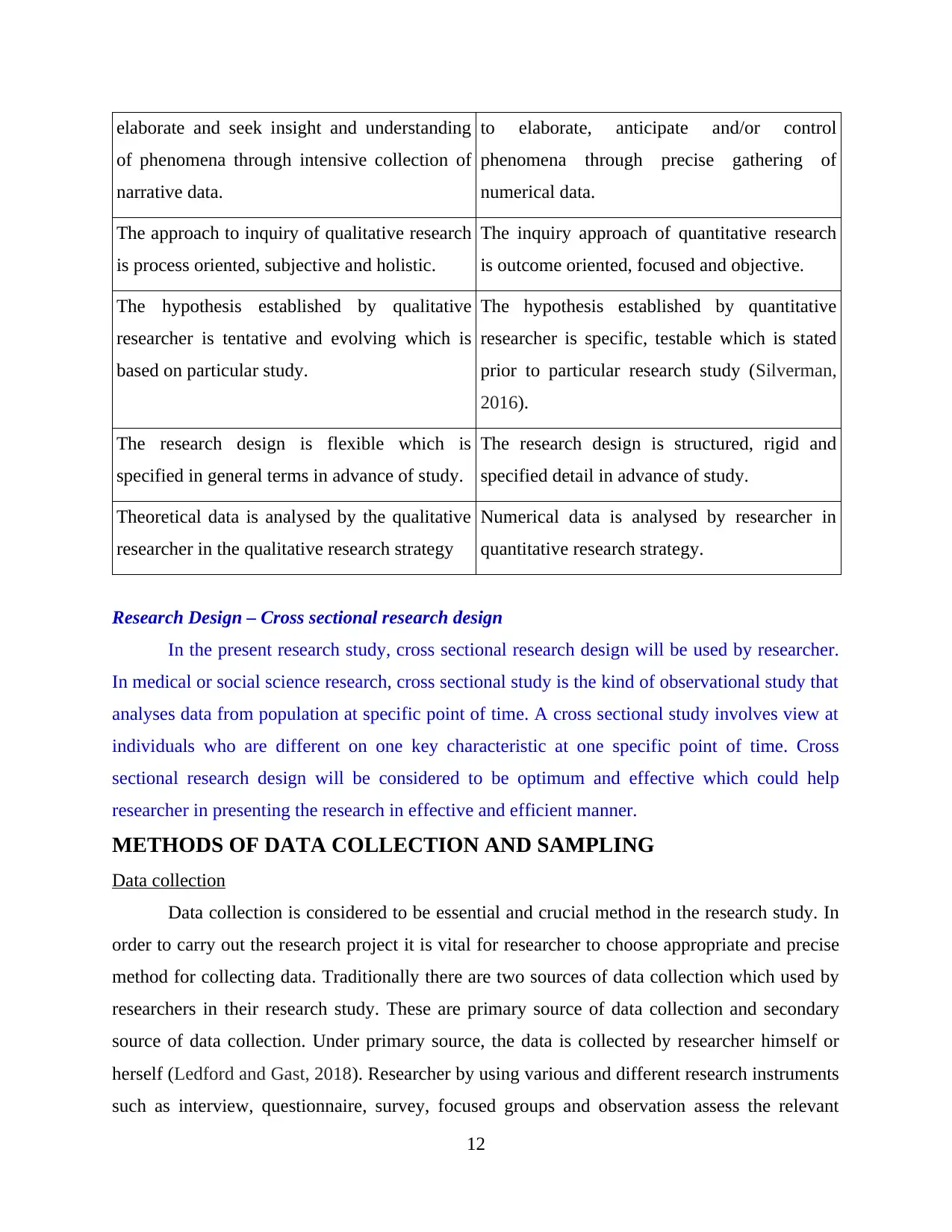
elaborate and seek insight and understanding
of phenomena through intensive collection of
narrative data.
to elaborate, anticipate and/or control
phenomena through precise gathering of
numerical data.
The approach to inquiry of qualitative research
is process oriented, subjective and holistic.
The inquiry approach of quantitative research
is outcome oriented, focused and objective.
The hypothesis established by qualitative
researcher is tentative and evolving which is
based on particular study.
The hypothesis established by quantitative
researcher is specific, testable which is stated
prior to particular research study (Silverman,
2016).
The research design is flexible which is
specified in general terms in advance of study.
The research design is structured, rigid and
specified detail in advance of study.
Theoretical data is analysed by the qualitative
researcher in the qualitative research strategy
Numerical data is analysed by researcher in
quantitative research strategy.
Research Design – Cross sectional research design
In the present research study, cross sectional research design will be used by researcher.
In medical or social science research, cross sectional study is the kind of observational study that
analyses data from population at specific point of time. A cross sectional study involves view at
individuals who are different on one key characteristic at one specific point of time. Cross
sectional research design will be considered to be optimum and effective which could help
researcher in presenting the research in effective and efficient manner.
METHODS OF DATA COLLECTION AND SAMPLING
Data collection
Data collection is considered to be essential and crucial method in the research study. In
order to carry out the research project it is vital for researcher to choose appropriate and precise
method for collecting data. Traditionally there are two sources of data collection which used by
researchers in their research study. These are primary source of data collection and secondary
source of data collection. Under primary source, the data is collected by researcher himself or
herself (Ledford and Gast, 2018). Researcher by using various and different research instruments
such as interview, questionnaire, survey, focused groups and observation assess the relevant
12
of phenomena through intensive collection of
narrative data.
to elaborate, anticipate and/or control
phenomena through precise gathering of
numerical data.
The approach to inquiry of qualitative research
is process oriented, subjective and holistic.
The inquiry approach of quantitative research
is outcome oriented, focused and objective.
The hypothesis established by qualitative
researcher is tentative and evolving which is
based on particular study.
The hypothesis established by quantitative
researcher is specific, testable which is stated
prior to particular research study (Silverman,
2016).
The research design is flexible which is
specified in general terms in advance of study.
The research design is structured, rigid and
specified detail in advance of study.
Theoretical data is analysed by the qualitative
researcher in the qualitative research strategy
Numerical data is analysed by researcher in
quantitative research strategy.
Research Design – Cross sectional research design
In the present research study, cross sectional research design will be used by researcher.
In medical or social science research, cross sectional study is the kind of observational study that
analyses data from population at specific point of time. A cross sectional study involves view at
individuals who are different on one key characteristic at one specific point of time. Cross
sectional research design will be considered to be optimum and effective which could help
researcher in presenting the research in effective and efficient manner.
METHODS OF DATA COLLECTION AND SAMPLING
Data collection
Data collection is considered to be essential and crucial method in the research study. In
order to carry out the research project it is vital for researcher to choose appropriate and precise
method for collecting data. Traditionally there are two sources of data collection which used by
researchers in their research study. These are primary source of data collection and secondary
source of data collection. Under primary source, the data is collected by researcher himself or
herself (Ledford and Gast, 2018). Researcher by using various and different research instruments
such as interview, questionnaire, survey, focused groups and observation assess the relevant
12
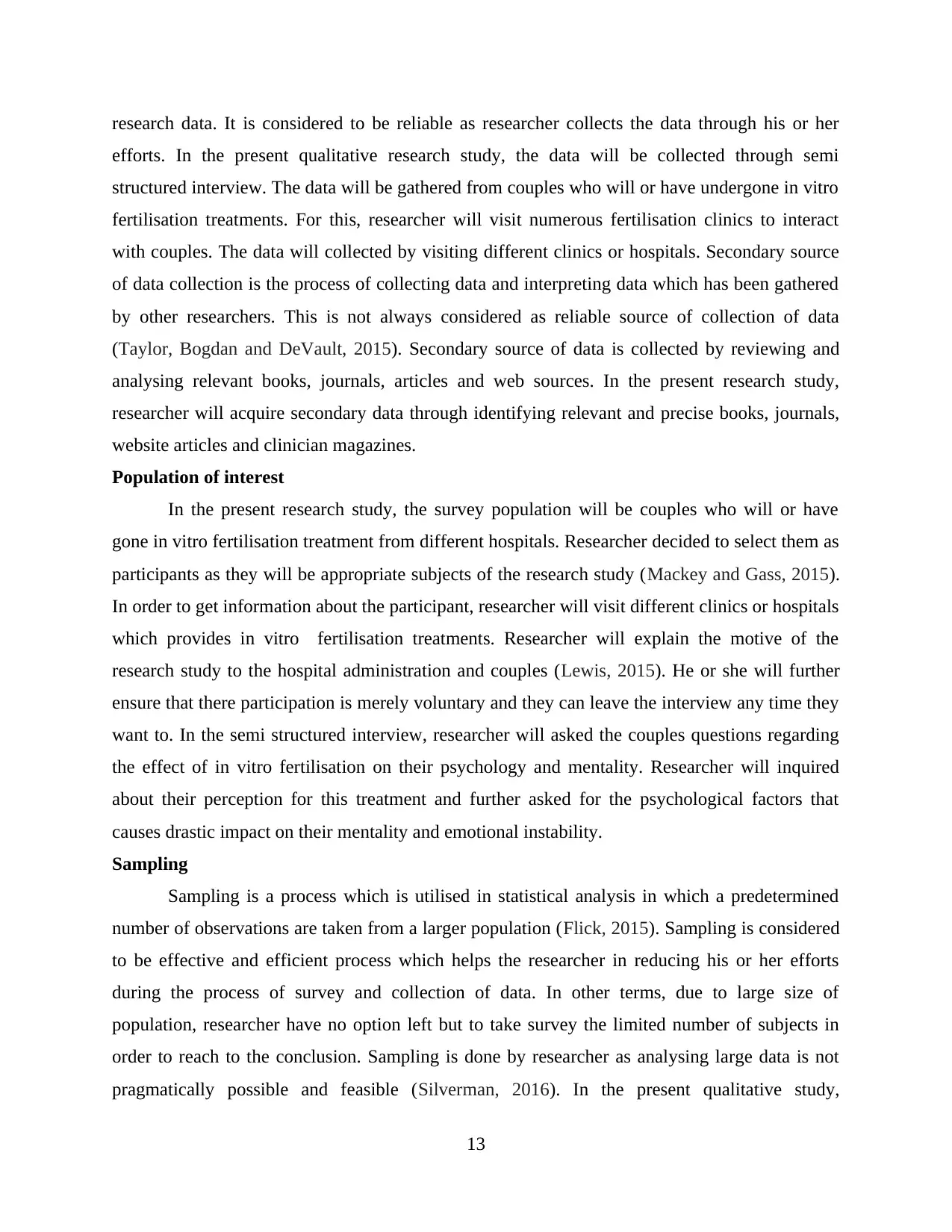
research data. It is considered to be reliable as researcher collects the data through his or her
efforts. In the present qualitative research study, the data will be collected through semi
structured interview. The data will be gathered from couples who will or have undergone in vitro
fertilisation treatments. For this, researcher will visit numerous fertilisation clinics to interact
with couples. The data will collected by visiting different clinics or hospitals. Secondary source
of data collection is the process of collecting data and interpreting data which has been gathered
by other researchers. This is not always considered as reliable source of collection of data
(Taylor, Bogdan and DeVault, 2015). Secondary source of data is collected by reviewing and
analysing relevant books, journals, articles and web sources. In the present research study,
researcher will acquire secondary data through identifying relevant and precise books, journals,
website articles and clinician magazines.
Population of interest
In the present research study, the survey population will be couples who will or have
gone in vitro fertilisation treatment from different hospitals. Researcher decided to select them as
participants as they will be appropriate subjects of the research study (Mackey and Gass, 2015).
In order to get information about the participant, researcher will visit different clinics or hospitals
which provides in vitro fertilisation treatments. Researcher will explain the motive of the
research study to the hospital administration and couples (Lewis, 2015). He or she will further
ensure that there participation is merely voluntary and they can leave the interview any time they
want to. In the semi structured interview, researcher will asked the couples questions regarding
the effect of in vitro fertilisation on their psychology and mentality. Researcher will inquired
about their perception for this treatment and further asked for the psychological factors that
causes drastic impact on their mentality and emotional instability.
Sampling
Sampling is a process which is utilised in statistical analysis in which a predetermined
number of observations are taken from a larger population (Flick, 2015). Sampling is considered
to be effective and efficient process which helps the researcher in reducing his or her efforts
during the process of survey and collection of data. In other terms, due to large size of
population, researcher have no option left but to take survey the limited number of subjects in
order to reach to the conclusion. Sampling is done by researcher as analysing large data is not
pragmatically possible and feasible (Silverman, 2016). In the present qualitative study,
13
efforts. In the present qualitative research study, the data will be collected through semi
structured interview. The data will be gathered from couples who will or have undergone in vitro
fertilisation treatments. For this, researcher will visit numerous fertilisation clinics to interact
with couples. The data will collected by visiting different clinics or hospitals. Secondary source
of data collection is the process of collecting data and interpreting data which has been gathered
by other researchers. This is not always considered as reliable source of collection of data
(Taylor, Bogdan and DeVault, 2015). Secondary source of data is collected by reviewing and
analysing relevant books, journals, articles and web sources. In the present research study,
researcher will acquire secondary data through identifying relevant and precise books, journals,
website articles and clinician magazines.
Population of interest
In the present research study, the survey population will be couples who will or have
gone in vitro fertilisation treatment from different hospitals. Researcher decided to select them as
participants as they will be appropriate subjects of the research study (Mackey and Gass, 2015).
In order to get information about the participant, researcher will visit different clinics or hospitals
which provides in vitro fertilisation treatments. Researcher will explain the motive of the
research study to the hospital administration and couples (Lewis, 2015). He or she will further
ensure that there participation is merely voluntary and they can leave the interview any time they
want to. In the semi structured interview, researcher will asked the couples questions regarding
the effect of in vitro fertilisation on their psychology and mentality. Researcher will inquired
about their perception for this treatment and further asked for the psychological factors that
causes drastic impact on their mentality and emotional instability.
Sampling
Sampling is a process which is utilised in statistical analysis in which a predetermined
number of observations are taken from a larger population (Flick, 2015). Sampling is considered
to be effective and efficient process which helps the researcher in reducing his or her efforts
during the process of survey and collection of data. In other terms, due to large size of
population, researcher have no option left but to take survey the limited number of subjects in
order to reach to the conclusion. Sampling is done by researcher as analysing large data is not
pragmatically possible and feasible (Silverman, 2016). In the present qualitative study,
13
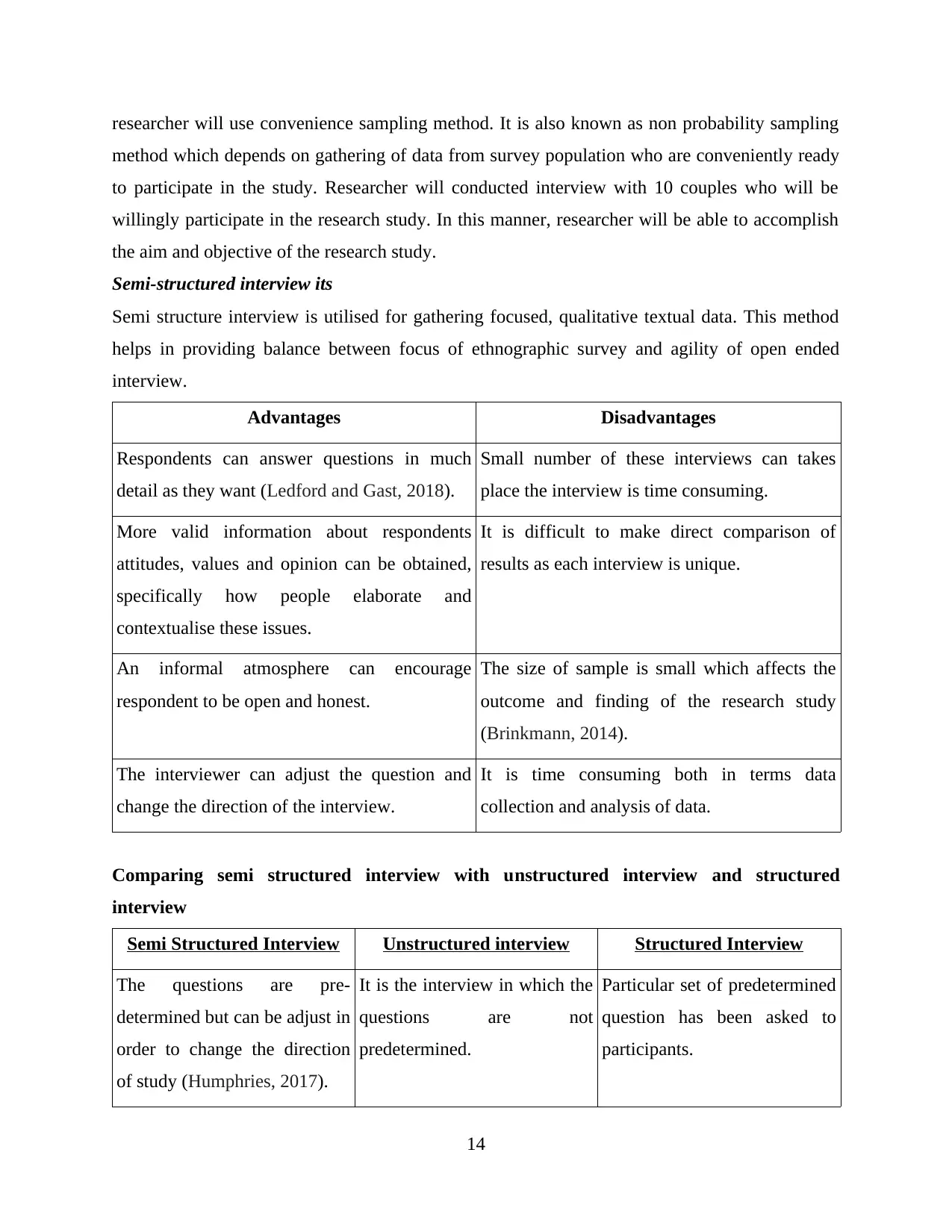
researcher will use convenience sampling method. It is also known as non probability sampling
method which depends on gathering of data from survey population who are conveniently ready
to participate in the study. Researcher will conducted interview with 10 couples who will be
willingly participate in the research study. In this manner, researcher will be able to accomplish
the aim and objective of the research study.
Semi-structured interview its
Semi structure interview is utilised for gathering focused, qualitative textual data. This method
helps in providing balance between focus of ethnographic survey and agility of open ended
interview.
Advantages Disadvantages
Respondents can answer questions in much
detail as they want (Ledford and Gast, 2018).
Small number of these interviews can takes
place the interview is time consuming.
More valid information about respondents
attitudes, values and opinion can be obtained,
specifically how people elaborate and
contextualise these issues.
It is difficult to make direct comparison of
results as each interview is unique.
An informal atmosphere can encourage
respondent to be open and honest.
The size of sample is small which affects the
outcome and finding of the research study
(Brinkmann, 2014).
The interviewer can adjust the question and
change the direction of the interview.
It is time consuming both in terms data
collection and analysis of data.
Comparing semi structured interview with unstructured interview and structured
interview
Semi Structured Interview Unstructured interview Structured Interview
The questions are pre-
determined but can be adjust in
order to change the direction
of study (Humphries, 2017).
It is the interview in which the
questions are not
predetermined.
Particular set of predetermined
question has been asked to
participants.
14
method which depends on gathering of data from survey population who are conveniently ready
to participate in the study. Researcher will conducted interview with 10 couples who will be
willingly participate in the research study. In this manner, researcher will be able to accomplish
the aim and objective of the research study.
Semi-structured interview its
Semi structure interview is utilised for gathering focused, qualitative textual data. This method
helps in providing balance between focus of ethnographic survey and agility of open ended
interview.
Advantages Disadvantages
Respondents can answer questions in much
detail as they want (Ledford and Gast, 2018).
Small number of these interviews can takes
place the interview is time consuming.
More valid information about respondents
attitudes, values and opinion can be obtained,
specifically how people elaborate and
contextualise these issues.
It is difficult to make direct comparison of
results as each interview is unique.
An informal atmosphere can encourage
respondent to be open and honest.
The size of sample is small which affects the
outcome and finding of the research study
(Brinkmann, 2014).
The interviewer can adjust the question and
change the direction of the interview.
It is time consuming both in terms data
collection and analysis of data.
Comparing semi structured interview with unstructured interview and structured
interview
Semi Structured Interview Unstructured interview Structured Interview
The questions are pre-
determined but can be adjust in
order to change the direction
of study (Humphries, 2017).
It is the interview in which the
questions are not
predetermined.
Particular set of predetermined
question has been asked to
participants.
14
Secure Best Marks with AI Grader
Need help grading? Try our AI Grader for instant feedback on your assignments.
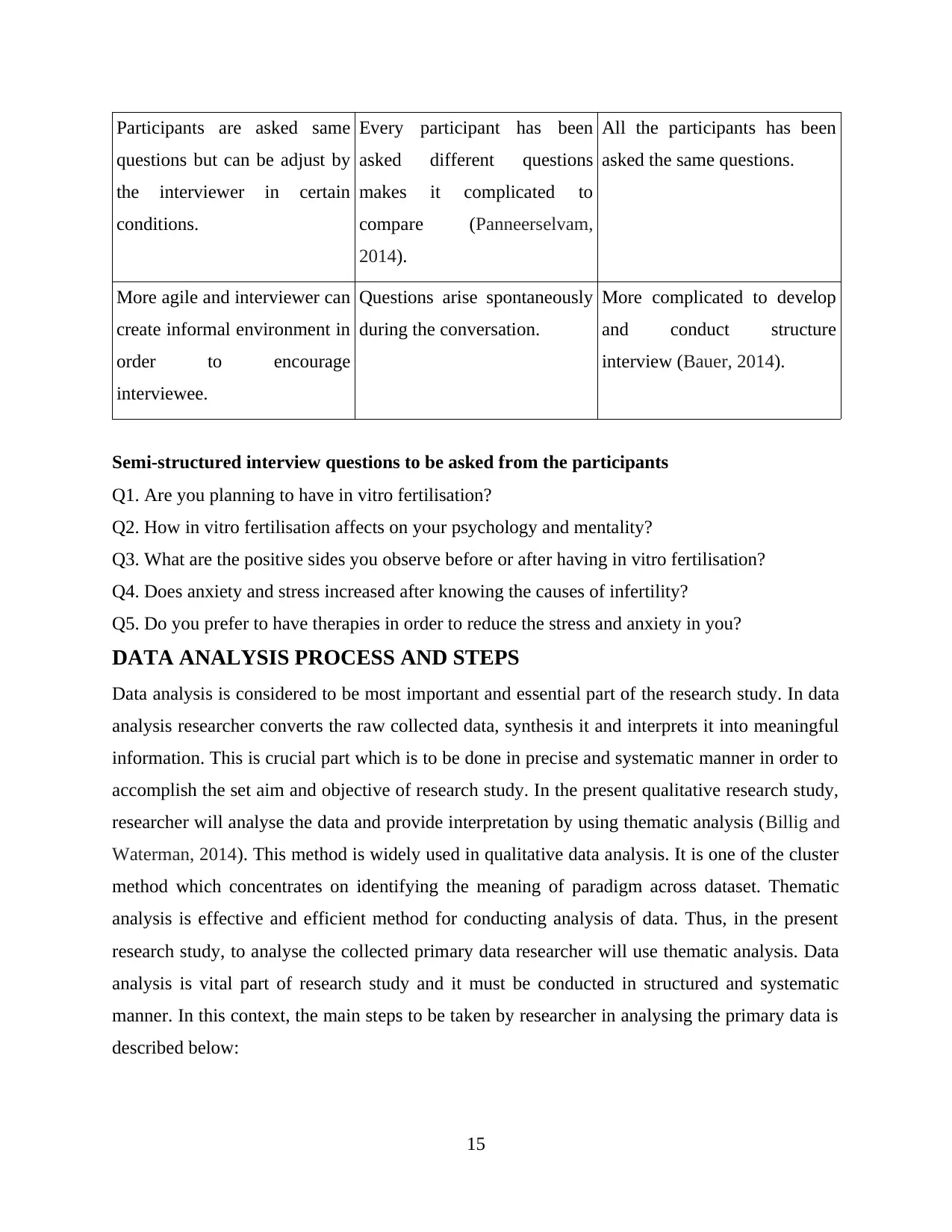
Participants are asked same
questions but can be adjust by
the interviewer in certain
conditions.
Every participant has been
asked different questions
makes it complicated to
compare (Panneerselvam,
2014).
All the participants has been
asked the same questions.
More agile and interviewer can
create informal environment in
order to encourage
interviewee.
Questions arise spontaneously
during the conversation.
More complicated to develop
and conduct structure
interview (Bauer, 2014).
Semi-structured interview questions to be asked from the participants
Q1. Are you planning to have in vitro fertilisation?
Q2. How in vitro fertilisation affects on your psychology and mentality?
Q3. What are the positive sides you observe before or after having in vitro fertilisation?
Q4. Does anxiety and stress increased after knowing the causes of infertility?
Q5. Do you prefer to have therapies in order to reduce the stress and anxiety in you?
DATA ANALYSIS PROCESS AND STEPS
Data analysis is considered to be most important and essential part of the research study. In data
analysis researcher converts the raw collected data, synthesis it and interprets it into meaningful
information. This is crucial part which is to be done in precise and systematic manner in order to
accomplish the set aim and objective of research study. In the present qualitative research study,
researcher will analyse the data and provide interpretation by using thematic analysis (Billig and
Waterman, 2014). This method is widely used in qualitative data analysis. It is one of the cluster
method which concentrates on identifying the meaning of paradigm across dataset. Thematic
analysis is effective and efficient method for conducting analysis of data. Thus, in the present
research study, to analyse the collected primary data researcher will use thematic analysis. Data
analysis is vital part of research study and it must be conducted in structured and systematic
manner. In this context, the main steps to be taken by researcher in analysing the primary data is
described below:
15
questions but can be adjust by
the interviewer in certain
conditions.
Every participant has been
asked different questions
makes it complicated to
compare (Panneerselvam,
2014).
All the participants has been
asked the same questions.
More agile and interviewer can
create informal environment in
order to encourage
interviewee.
Questions arise spontaneously
during the conversation.
More complicated to develop
and conduct structure
interview (Bauer, 2014).
Semi-structured interview questions to be asked from the participants
Q1. Are you planning to have in vitro fertilisation?
Q2. How in vitro fertilisation affects on your psychology and mentality?
Q3. What are the positive sides you observe before or after having in vitro fertilisation?
Q4. Does anxiety and stress increased after knowing the causes of infertility?
Q5. Do you prefer to have therapies in order to reduce the stress and anxiety in you?
DATA ANALYSIS PROCESS AND STEPS
Data analysis is considered to be most important and essential part of the research study. In data
analysis researcher converts the raw collected data, synthesis it and interprets it into meaningful
information. This is crucial part which is to be done in precise and systematic manner in order to
accomplish the set aim and objective of research study. In the present qualitative research study,
researcher will analyse the data and provide interpretation by using thematic analysis (Billig and
Waterman, 2014). This method is widely used in qualitative data analysis. It is one of the cluster
method which concentrates on identifying the meaning of paradigm across dataset. Thematic
analysis is effective and efficient method for conducting analysis of data. Thus, in the present
research study, to analyse the collected primary data researcher will use thematic analysis. Data
analysis is vital part of research study and it must be conducted in structured and systematic
manner. In this context, the main steps to be taken by researcher in analysing the primary data is
described below:
15
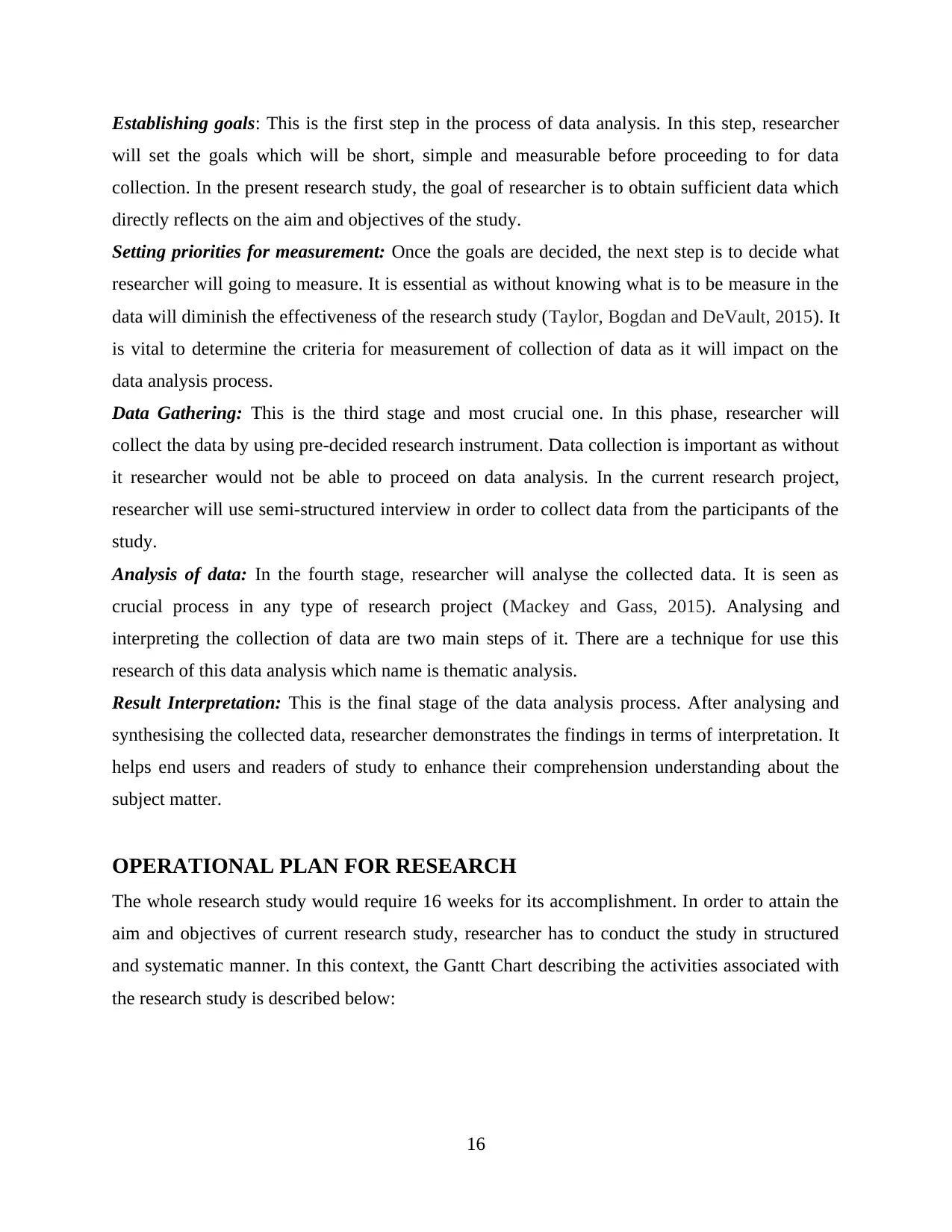
Establishing goals: This is the first step in the process of data analysis. In this step, researcher
will set the goals which will be short, simple and measurable before proceeding to for data
collection. In the present research study, the goal of researcher is to obtain sufficient data which
directly reflects on the aim and objectives of the study.
Setting priorities for measurement: Once the goals are decided, the next step is to decide what
researcher will going to measure. It is essential as without knowing what is to be measure in the
data will diminish the effectiveness of the research study (Taylor, Bogdan and DeVault, 2015). It
is vital to determine the criteria for measurement of collection of data as it will impact on the
data analysis process.
Data Gathering: This is the third stage and most crucial one. In this phase, researcher will
collect the data by using pre-decided research instrument. Data collection is important as without
it researcher would not be able to proceed on data analysis. In the current research project,
researcher will use semi-structured interview in order to collect data from the participants of the
study.
Analysis of data: In the fourth stage, researcher will analyse the collected data. It is seen as
crucial process in any type of research project (Mackey and Gass, 2015). Analysing and
interpreting the collection of data are two main steps of it. There are a technique for use this
research of this data analysis which name is thematic analysis.
Result Interpretation: This is the final stage of the data analysis process. After analysing and
synthesising the collected data, researcher demonstrates the findings in terms of interpretation. It
helps end users and readers of study to enhance their comprehension understanding about the
subject matter.
OPERATIONAL PLAN FOR RESEARCH
The whole research study would require 16 weeks for its accomplishment. In order to attain the
aim and objectives of current research study, researcher has to conduct the study in structured
and systematic manner. In this context, the Gantt Chart describing the activities associated with
the research study is described below:
16
will set the goals which will be short, simple and measurable before proceeding to for data
collection. In the present research study, the goal of researcher is to obtain sufficient data which
directly reflects on the aim and objectives of the study.
Setting priorities for measurement: Once the goals are decided, the next step is to decide what
researcher will going to measure. It is essential as without knowing what is to be measure in the
data will diminish the effectiveness of the research study (Taylor, Bogdan and DeVault, 2015). It
is vital to determine the criteria for measurement of collection of data as it will impact on the
data analysis process.
Data Gathering: This is the third stage and most crucial one. In this phase, researcher will
collect the data by using pre-decided research instrument. Data collection is important as without
it researcher would not be able to proceed on data analysis. In the current research project,
researcher will use semi-structured interview in order to collect data from the participants of the
study.
Analysis of data: In the fourth stage, researcher will analyse the collected data. It is seen as
crucial process in any type of research project (Mackey and Gass, 2015). Analysing and
interpreting the collection of data are two main steps of it. There are a technique for use this
research of this data analysis which name is thematic analysis.
Result Interpretation: This is the final stage of the data analysis process. After analysing and
synthesising the collected data, researcher demonstrates the findings in terms of interpretation. It
helps end users and readers of study to enhance their comprehension understanding about the
subject matter.
OPERATIONAL PLAN FOR RESEARCH
The whole research study would require 16 weeks for its accomplishment. In order to attain the
aim and objectives of current research study, researcher has to conduct the study in structured
and systematic manner. In this context, the Gantt Chart describing the activities associated with
the research study is described below:
16
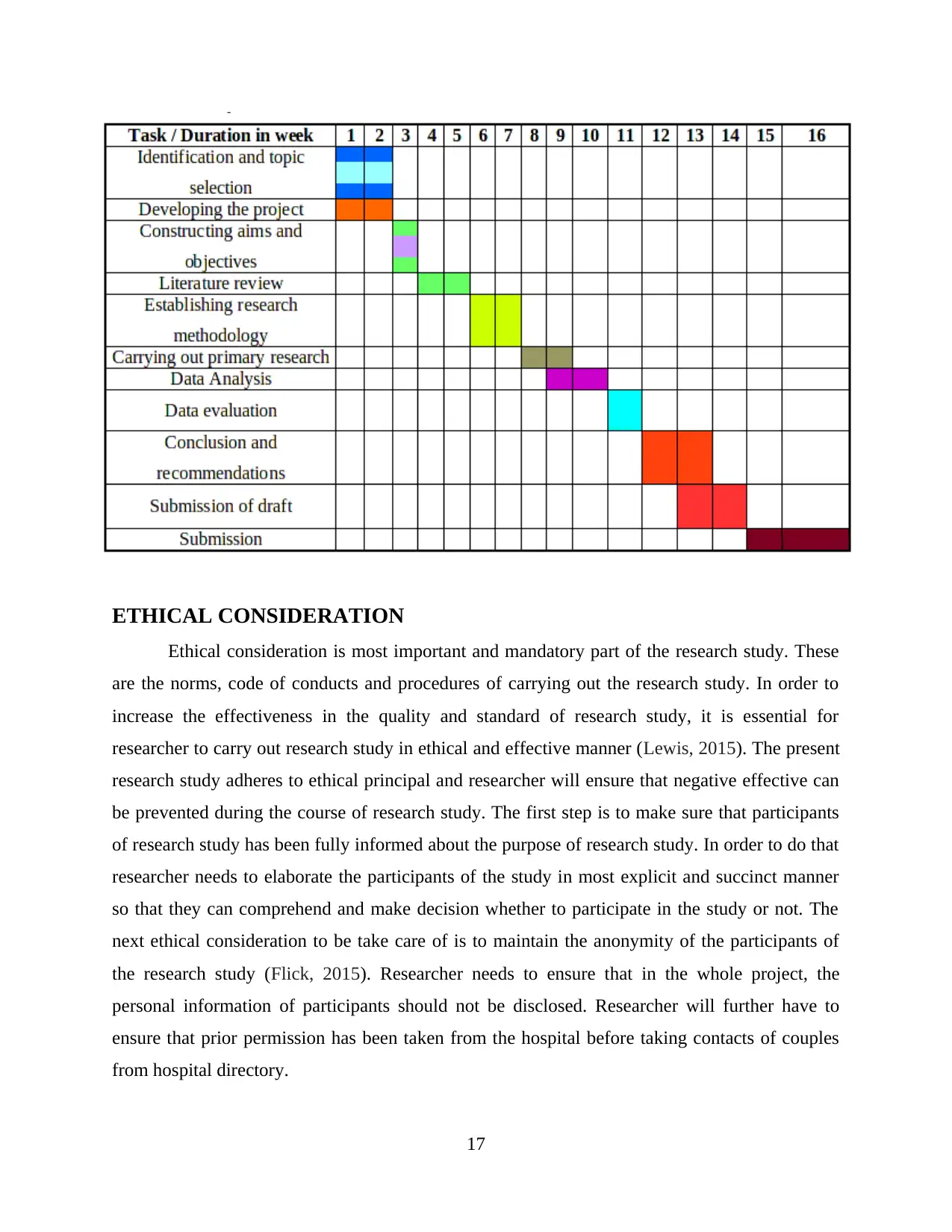
ETHICAL CONSIDERATION
Ethical consideration is most important and mandatory part of the research study. These
are the norms, code of conducts and procedures of carrying out the research study. In order to
increase the effectiveness in the quality and standard of research study, it is essential for
researcher to carry out research study in ethical and effective manner (Lewis, 2015). The present
research study adheres to ethical principal and researcher will ensure that negative effective can
be prevented during the course of research study. The first step is to make sure that participants
of research study has been fully informed about the purpose of research study. In order to do that
researcher needs to elaborate the participants of the study in most explicit and succinct manner
so that they can comprehend and make decision whether to participate in the study or not. The
next ethical consideration to be take care of is to maintain the anonymity of the participants of
the research study (Flick, 2015). Researcher needs to ensure that in the whole project, the
personal information of participants should not be disclosed. Researcher will further have to
ensure that prior permission has been taken from the hospital before taking contacts of couples
from hospital directory.
17
Ethical consideration is most important and mandatory part of the research study. These
are the norms, code of conducts and procedures of carrying out the research study. In order to
increase the effectiveness in the quality and standard of research study, it is essential for
researcher to carry out research study in ethical and effective manner (Lewis, 2015). The present
research study adheres to ethical principal and researcher will ensure that negative effective can
be prevented during the course of research study. The first step is to make sure that participants
of research study has been fully informed about the purpose of research study. In order to do that
researcher needs to elaborate the participants of the study in most explicit and succinct manner
so that they can comprehend and make decision whether to participate in the study or not. The
next ethical consideration to be take care of is to maintain the anonymity of the participants of
the research study (Flick, 2015). Researcher needs to ensure that in the whole project, the
personal information of participants should not be disclosed. Researcher will further have to
ensure that prior permission has been taken from the hospital before taking contacts of couples
from hospital directory.
17
Paraphrase This Document
Need a fresh take? Get an instant paraphrase of this document with our AI Paraphraser
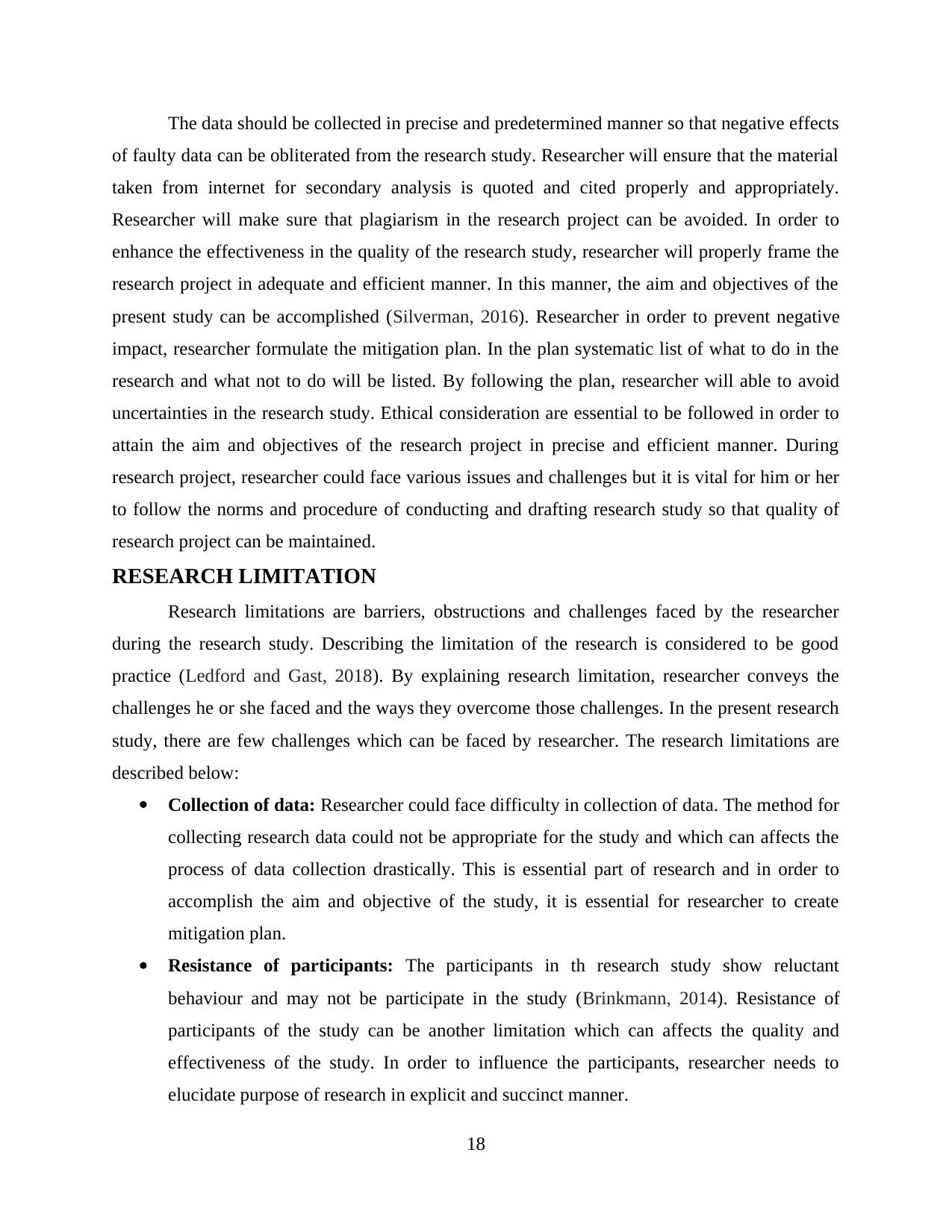
The data should be collected in precise and predetermined manner so that negative effects
of faulty data can be obliterated from the research study. Researcher will ensure that the material
taken from internet for secondary analysis is quoted and cited properly and appropriately.
Researcher will make sure that plagiarism in the research project can be avoided. In order to
enhance the effectiveness in the quality of the research study, researcher will properly frame the
research project in adequate and efficient manner. In this manner, the aim and objectives of the
present study can be accomplished (Silverman, 2016). Researcher in order to prevent negative
impact, researcher formulate the mitigation plan. In the plan systematic list of what to do in the
research and what not to do will be listed. By following the plan, researcher will able to avoid
uncertainties in the research study. Ethical consideration are essential to be followed in order to
attain the aim and objectives of the research project in precise and efficient manner. During
research project, researcher could face various issues and challenges but it is vital for him or her
to follow the norms and procedure of conducting and drafting research study so that quality of
research project can be maintained.
RESEARCH LIMITATION
Research limitations are barriers, obstructions and challenges faced by the researcher
during the research study. Describing the limitation of the research is considered to be good
practice (Ledford and Gast, 2018). By explaining research limitation, researcher conveys the
challenges he or she faced and the ways they overcome those challenges. In the present research
study, there are few challenges which can be faced by researcher. The research limitations are
described below:
Collection of data: Researcher could face difficulty in collection of data. The method for
collecting research data could not be appropriate for the study and which can affects the
process of data collection drastically. This is essential part of research and in order to
accomplish the aim and objective of the study, it is essential for researcher to create
mitigation plan.
Resistance of participants: The participants in th research study show reluctant
behaviour and may not be participate in the study (Brinkmann, 2014). Resistance of
participants of the study can be another limitation which can affects the quality and
effectiveness of the study. In order to influence the participants, researcher needs to
elucidate purpose of research in explicit and succinct manner.
18
of faulty data can be obliterated from the research study. Researcher will ensure that the material
taken from internet for secondary analysis is quoted and cited properly and appropriately.
Researcher will make sure that plagiarism in the research project can be avoided. In order to
enhance the effectiveness in the quality of the research study, researcher will properly frame the
research project in adequate and efficient manner. In this manner, the aim and objectives of the
present study can be accomplished (Silverman, 2016). Researcher in order to prevent negative
impact, researcher formulate the mitigation plan. In the plan systematic list of what to do in the
research and what not to do will be listed. By following the plan, researcher will able to avoid
uncertainties in the research study. Ethical consideration are essential to be followed in order to
attain the aim and objectives of the research project in precise and efficient manner. During
research project, researcher could face various issues and challenges but it is vital for him or her
to follow the norms and procedure of conducting and drafting research study so that quality of
research project can be maintained.
RESEARCH LIMITATION
Research limitations are barriers, obstructions and challenges faced by the researcher
during the research study. Describing the limitation of the research is considered to be good
practice (Ledford and Gast, 2018). By explaining research limitation, researcher conveys the
challenges he or she faced and the ways they overcome those challenges. In the present research
study, there are few challenges which can be faced by researcher. The research limitations are
described below:
Collection of data: Researcher could face difficulty in collection of data. The method for
collecting research data could not be appropriate for the study and which can affects the
process of data collection drastically. This is essential part of research and in order to
accomplish the aim and objective of the study, it is essential for researcher to create
mitigation plan.
Resistance of participants: The participants in th research study show reluctant
behaviour and may not be participate in the study (Brinkmann, 2014). Resistance of
participants of the study can be another limitation which can affects the quality and
effectiveness of the study. In order to influence the participants, researcher needs to
elucidate purpose of research in explicit and succinct manner.
18
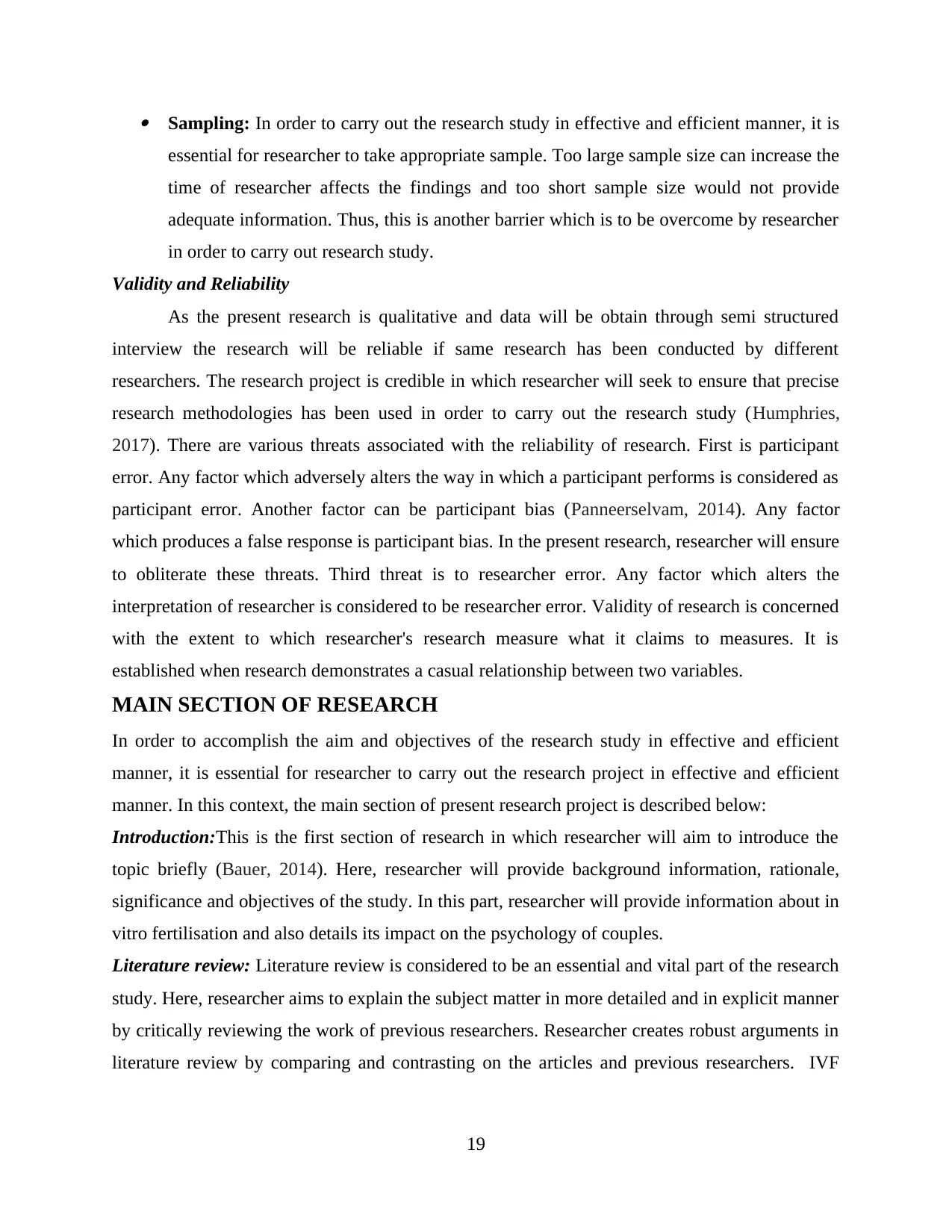
Sampling: In order to carry out the research study in effective and efficient manner, it is
essential for researcher to take appropriate sample. Too large sample size can increase the
time of researcher affects the findings and too short sample size would not provide
adequate information. Thus, this is another barrier which is to be overcome by researcher
in order to carry out research study.
Validity and Reliability
As the present research is qualitative and data will be obtain through semi structured
interview the research will be reliable if same research has been conducted by different
researchers. The research project is credible in which researcher will seek to ensure that precise
research methodologies has been used in order to carry out the research study (Humphries,
2017). There are various threats associated with the reliability of research. First is participant
error. Any factor which adversely alters the way in which a participant performs is considered as
participant error. Another factor can be participant bias (Panneerselvam, 2014). Any factor
which produces a false response is participant bias. In the present research, researcher will ensure
to obliterate these threats. Third threat is to researcher error. Any factor which alters the
interpretation of researcher is considered to be researcher error. Validity of research is concerned
with the extent to which researcher's research measure what it claims to measures. It is
established when research demonstrates a casual relationship between two variables.
MAIN SECTION OF RESEARCH
In order to accomplish the aim and objectives of the research study in effective and efficient
manner, it is essential for researcher to carry out the research project in effective and efficient
manner. In this context, the main section of present research project is described below:
Introduction:This is the first section of research in which researcher will aim to introduce the
topic briefly (Bauer, 2014). Here, researcher will provide background information, rationale,
significance and objectives of the study. In this part, researcher will provide information about in
vitro fertilisation and also details its impact on the psychology of couples.
Literature review: Literature review is considered to be an essential and vital part of the research
study. Here, researcher aims to explain the subject matter in more detailed and in explicit manner
by critically reviewing the work of previous researchers. Researcher creates robust arguments in
literature review by comparing and contrasting on the articles and previous researchers. IVF
19
essential for researcher to take appropriate sample. Too large sample size can increase the
time of researcher affects the findings and too short sample size would not provide
adequate information. Thus, this is another barrier which is to be overcome by researcher
in order to carry out research study.
Validity and Reliability
As the present research is qualitative and data will be obtain through semi structured
interview the research will be reliable if same research has been conducted by different
researchers. The research project is credible in which researcher will seek to ensure that precise
research methodologies has been used in order to carry out the research study (Humphries,
2017). There are various threats associated with the reliability of research. First is participant
error. Any factor which adversely alters the way in which a participant performs is considered as
participant error. Another factor can be participant bias (Panneerselvam, 2014). Any factor
which produces a false response is participant bias. In the present research, researcher will ensure
to obliterate these threats. Third threat is to researcher error. Any factor which alters the
interpretation of researcher is considered to be researcher error. Validity of research is concerned
with the extent to which researcher's research measure what it claims to measures. It is
established when research demonstrates a casual relationship between two variables.
MAIN SECTION OF RESEARCH
In order to accomplish the aim and objectives of the research study in effective and efficient
manner, it is essential for researcher to carry out the research project in effective and efficient
manner. In this context, the main section of present research project is described below:
Introduction:This is the first section of research in which researcher will aim to introduce the
topic briefly (Bauer, 2014). Here, researcher will provide background information, rationale,
significance and objectives of the study. In this part, researcher will provide information about in
vitro fertilisation and also details its impact on the psychology of couples.
Literature review: Literature review is considered to be an essential and vital part of the research
study. Here, researcher aims to explain the subject matter in more detailed and in explicit manner
by critically reviewing the work of previous researchers. Researcher creates robust arguments in
literature review by comparing and contrasting on the articles and previous researchers. IVF
19
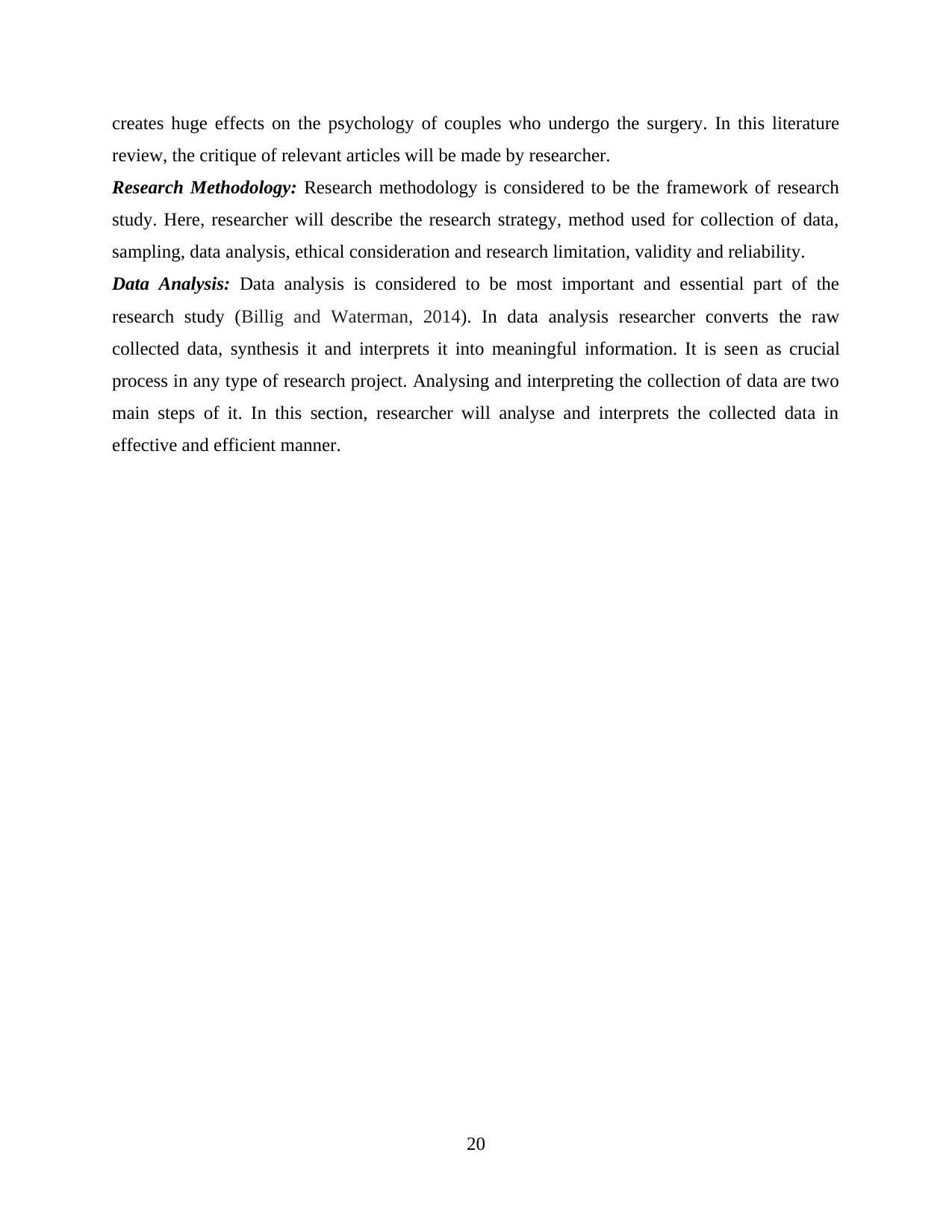
creates huge effects on the psychology of couples who undergo the surgery. In this literature
review, the critique of relevant articles will be made by researcher.
Research Methodology: Research methodology is considered to be the framework of research
study. Here, researcher will describe the research strategy, method used for collection of data,
sampling, data analysis, ethical consideration and research limitation, validity and reliability.
Data Analysis: Data analysis is considered to be most important and essential part of the
research study (Billig and Waterman, 2014). In data analysis researcher converts the raw
collected data, synthesis it and interprets it into meaningful information. It is seen as crucial
process in any type of research project. Analysing and interpreting the collection of data are two
main steps of it. In this section, researcher will analyse and interprets the collected data in
effective and efficient manner.
20
review, the critique of relevant articles will be made by researcher.
Research Methodology: Research methodology is considered to be the framework of research
study. Here, researcher will describe the research strategy, method used for collection of data,
sampling, data analysis, ethical consideration and research limitation, validity and reliability.
Data Analysis: Data analysis is considered to be most important and essential part of the
research study (Billig and Waterman, 2014). In data analysis researcher converts the raw
collected data, synthesis it and interprets it into meaningful information. It is seen as crucial
process in any type of research project. Analysing and interpreting the collection of data are two
main steps of it. In this section, researcher will analyse and interprets the collected data in
effective and efficient manner.
20
Secure Best Marks with AI Grader
Need help grading? Try our AI Grader for instant feedback on your assignments.
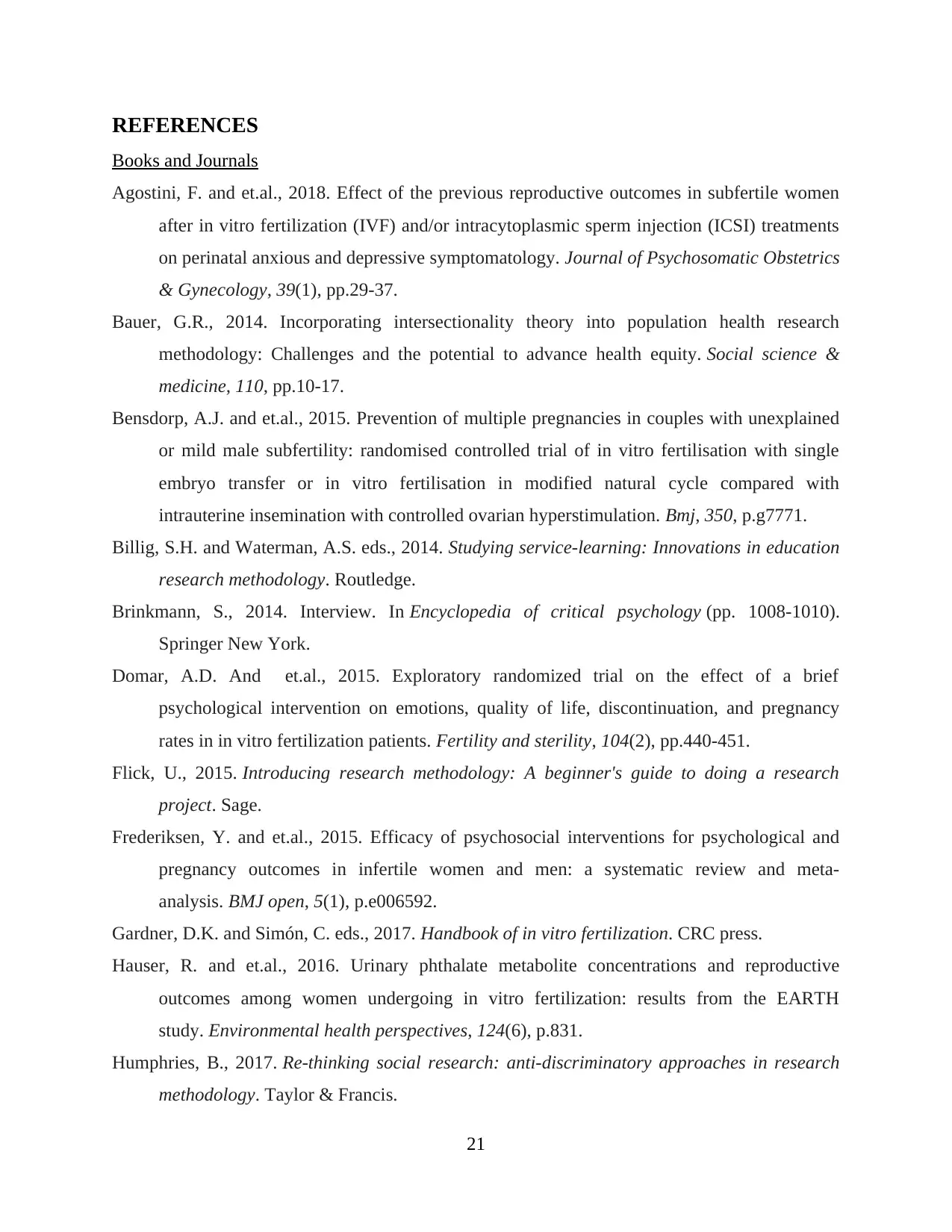
REFERENCES
Books and Journals
Agostini, F. and et.al., 2018. Effect of the previous reproductive outcomes in subfertile women
after in vitro fertilization (IVF) and/or intracytoplasmic sperm injection (ICSI) treatments
on perinatal anxious and depressive symptomatology. Journal of Psychosomatic Obstetrics
& Gynecology, 39(1), pp.29-37.
Bauer, G.R., 2014. Incorporating intersectionality theory into population health research
methodology: Challenges and the potential to advance health equity. Social science &
medicine, 110, pp.10-17.
Bensdorp, A.J. and et.al., 2015. Prevention of multiple pregnancies in couples with unexplained
or mild male subfertility: randomised controlled trial of in vitro fertilisation with single
embryo transfer or in vitro fertilisation in modified natural cycle compared with
intrauterine insemination with controlled ovarian hyperstimulation. Bmj, 350, p.g7771.
Billig, S.H. and Waterman, A.S. eds., 2014. Studying service-learning: Innovations in education
research methodology. Routledge.
Brinkmann, S., 2014. Interview. In Encyclopedia of critical psychology (pp. 1008-1010).
Springer New York.
Domar, A.D. And et.al., 2015. Exploratory randomized trial on the effect of a brief
psychological intervention on emotions, quality of life, discontinuation, and pregnancy
rates in in vitro fertilization patients. Fertility and sterility, 104(2), pp.440-451.
Flick, U., 2015. Introducing research methodology: A beginner's guide to doing a research
project. Sage.
Frederiksen, Y. and et.al., 2015. Efficacy of psychosocial interventions for psychological and
pregnancy outcomes in infertile women and men: a systematic review and meta-
analysis. BMJ open, 5(1), p.e006592.
Gardner, D.K. and Simón, C. eds., 2017. Handbook of in vitro fertilization. CRC press.
Hauser, R. and et.al., 2016. Urinary phthalate metabolite concentrations and reproductive
outcomes among women undergoing in vitro fertilization: results from the EARTH
study. Environmental health perspectives, 124(6), p.831.
Humphries, B., 2017. Re-thinking social research: anti-discriminatory approaches in research
methodology. Taylor & Francis.
21
Books and Journals
Agostini, F. and et.al., 2018. Effect of the previous reproductive outcomes in subfertile women
after in vitro fertilization (IVF) and/or intracytoplasmic sperm injection (ICSI) treatments
on perinatal anxious and depressive symptomatology. Journal of Psychosomatic Obstetrics
& Gynecology, 39(1), pp.29-37.
Bauer, G.R., 2014. Incorporating intersectionality theory into population health research
methodology: Challenges and the potential to advance health equity. Social science &
medicine, 110, pp.10-17.
Bensdorp, A.J. and et.al., 2015. Prevention of multiple pregnancies in couples with unexplained
or mild male subfertility: randomised controlled trial of in vitro fertilisation with single
embryo transfer or in vitro fertilisation in modified natural cycle compared with
intrauterine insemination with controlled ovarian hyperstimulation. Bmj, 350, p.g7771.
Billig, S.H. and Waterman, A.S. eds., 2014. Studying service-learning: Innovations in education
research methodology. Routledge.
Brinkmann, S., 2014. Interview. In Encyclopedia of critical psychology (pp. 1008-1010).
Springer New York.
Domar, A.D. And et.al., 2015. Exploratory randomized trial on the effect of a brief
psychological intervention on emotions, quality of life, discontinuation, and pregnancy
rates in in vitro fertilization patients. Fertility and sterility, 104(2), pp.440-451.
Flick, U., 2015. Introducing research methodology: A beginner's guide to doing a research
project. Sage.
Frederiksen, Y. and et.al., 2015. Efficacy of psychosocial interventions for psychological and
pregnancy outcomes in infertile women and men: a systematic review and meta-
analysis. BMJ open, 5(1), p.e006592.
Gardner, D.K. and Simón, C. eds., 2017. Handbook of in vitro fertilization. CRC press.
Hauser, R. and et.al., 2016. Urinary phthalate metabolite concentrations and reproductive
outcomes among women undergoing in vitro fertilization: results from the EARTH
study. Environmental health perspectives, 124(6), p.831.
Humphries, B., 2017. Re-thinking social research: anti-discriminatory approaches in research
methodology. Taylor & Francis.
21
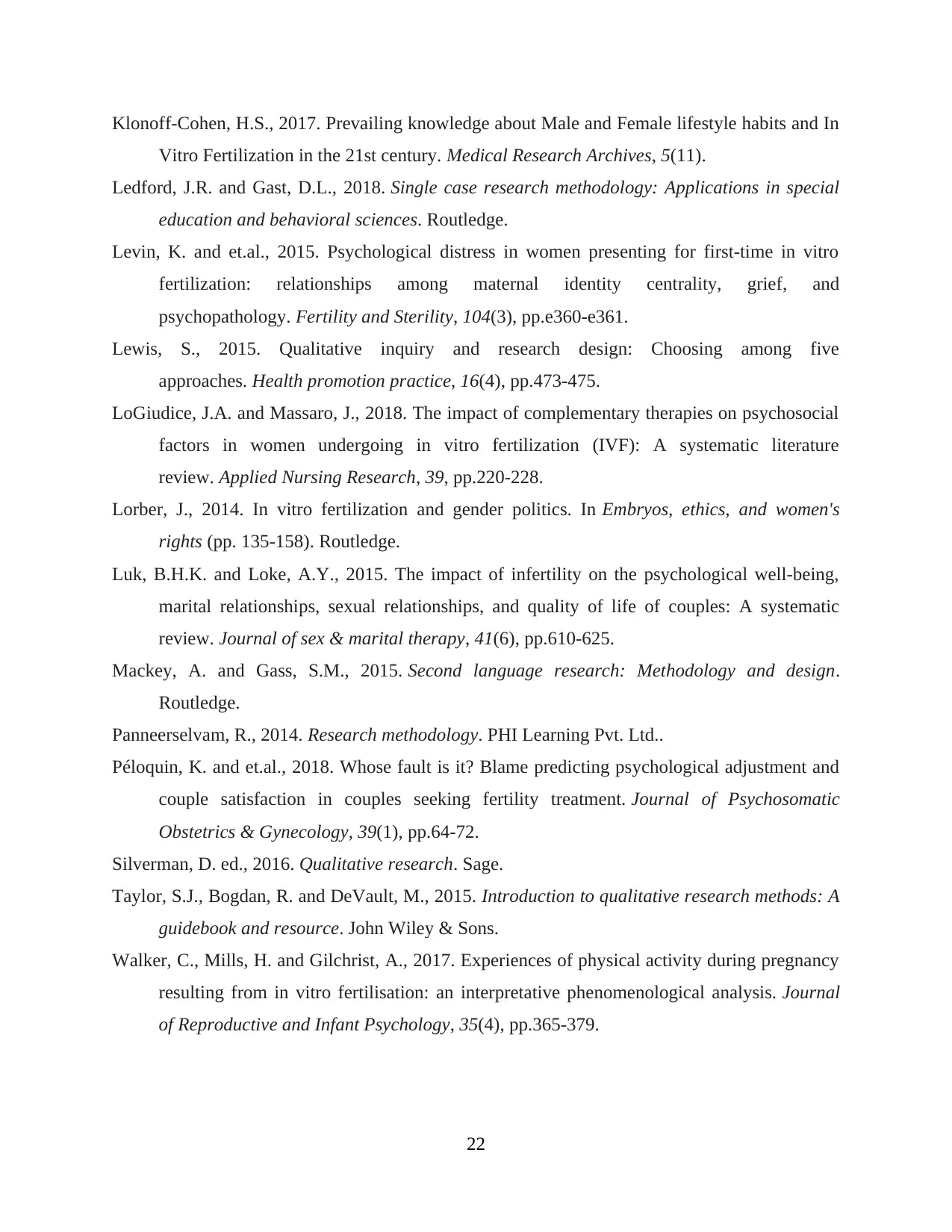
Klonoff-Cohen, H.S., 2017. Prevailing knowledge about Male and Female lifestyle habits and In
Vitro Fertilization in the 21st century. Medical Research Archives, 5(11).
Ledford, J.R. and Gast, D.L., 2018. Single case research methodology: Applications in special
education and behavioral sciences. Routledge.
Levin, K. and et.al., 2015. Psychological distress in women presenting for first-time in vitro
fertilization: relationships among maternal identity centrality, grief, and
psychopathology. Fertility and Sterility, 104(3), pp.e360-e361.
Lewis, S., 2015. Qualitative inquiry and research design: Choosing among five
approaches. Health promotion practice, 16(4), pp.473-475.
LoGiudice, J.A. and Massaro, J., 2018. The impact of complementary therapies on psychosocial
factors in women undergoing in vitro fertilization (IVF): A systematic literature
review. Applied Nursing Research, 39, pp.220-228.
Lorber, J., 2014. In vitro fertilization and gender politics. In Embryos, ethics, and women's
rights (pp. 135-158). Routledge.
Luk, B.H.K. and Loke, A.Y., 2015. The impact of infertility on the psychological well-being,
marital relationships, sexual relationships, and quality of life of couples: A systematic
review. Journal of sex & marital therapy, 41(6), pp.610-625.
Mackey, A. and Gass, S.M., 2015. Second language research: Methodology and design.
Routledge.
Panneerselvam, R., 2014. Research methodology. PHI Learning Pvt. Ltd..
Péloquin, K. and et.al., 2018. Whose fault is it? Blame predicting psychological adjustment and
couple satisfaction in couples seeking fertility treatment. Journal of Psychosomatic
Obstetrics & Gynecology, 39(1), pp.64-72.
Silverman, D. ed., 2016. Qualitative research. Sage.
Taylor, S.J., Bogdan, R. and DeVault, M., 2015. Introduction to qualitative research methods: A
guidebook and resource. John Wiley & Sons.
Walker, C., Mills, H. and Gilchrist, A., 2017. Experiences of physical activity during pregnancy
resulting from in vitro fertilisation: an interpretative phenomenological analysis. Journal
of Reproductive and Infant Psychology, 35(4), pp.365-379.
22
Vitro Fertilization in the 21st century. Medical Research Archives, 5(11).
Ledford, J.R. and Gast, D.L., 2018. Single case research methodology: Applications in special
education and behavioral sciences. Routledge.
Levin, K. and et.al., 2015. Psychological distress in women presenting for first-time in vitro
fertilization: relationships among maternal identity centrality, grief, and
psychopathology. Fertility and Sterility, 104(3), pp.e360-e361.
Lewis, S., 2015. Qualitative inquiry and research design: Choosing among five
approaches. Health promotion practice, 16(4), pp.473-475.
LoGiudice, J.A. and Massaro, J., 2018. The impact of complementary therapies on psychosocial
factors in women undergoing in vitro fertilization (IVF): A systematic literature
review. Applied Nursing Research, 39, pp.220-228.
Lorber, J., 2014. In vitro fertilization and gender politics. In Embryos, ethics, and women's
rights (pp. 135-158). Routledge.
Luk, B.H.K. and Loke, A.Y., 2015. The impact of infertility on the psychological well-being,
marital relationships, sexual relationships, and quality of life of couples: A systematic
review. Journal of sex & marital therapy, 41(6), pp.610-625.
Mackey, A. and Gass, S.M., 2015. Second language research: Methodology and design.
Routledge.
Panneerselvam, R., 2014. Research methodology. PHI Learning Pvt. Ltd..
Péloquin, K. and et.al., 2018. Whose fault is it? Blame predicting psychological adjustment and
couple satisfaction in couples seeking fertility treatment. Journal of Psychosomatic
Obstetrics & Gynecology, 39(1), pp.64-72.
Silverman, D. ed., 2016. Qualitative research. Sage.
Taylor, S.J., Bogdan, R. and DeVault, M., 2015. Introduction to qualitative research methods: A
guidebook and resource. John Wiley & Sons.
Walker, C., Mills, H. and Gilchrist, A., 2017. Experiences of physical activity during pregnancy
resulting from in vitro fertilisation: an interpretative phenomenological analysis. Journal
of Reproductive and Infant Psychology, 35(4), pp.365-379.
22
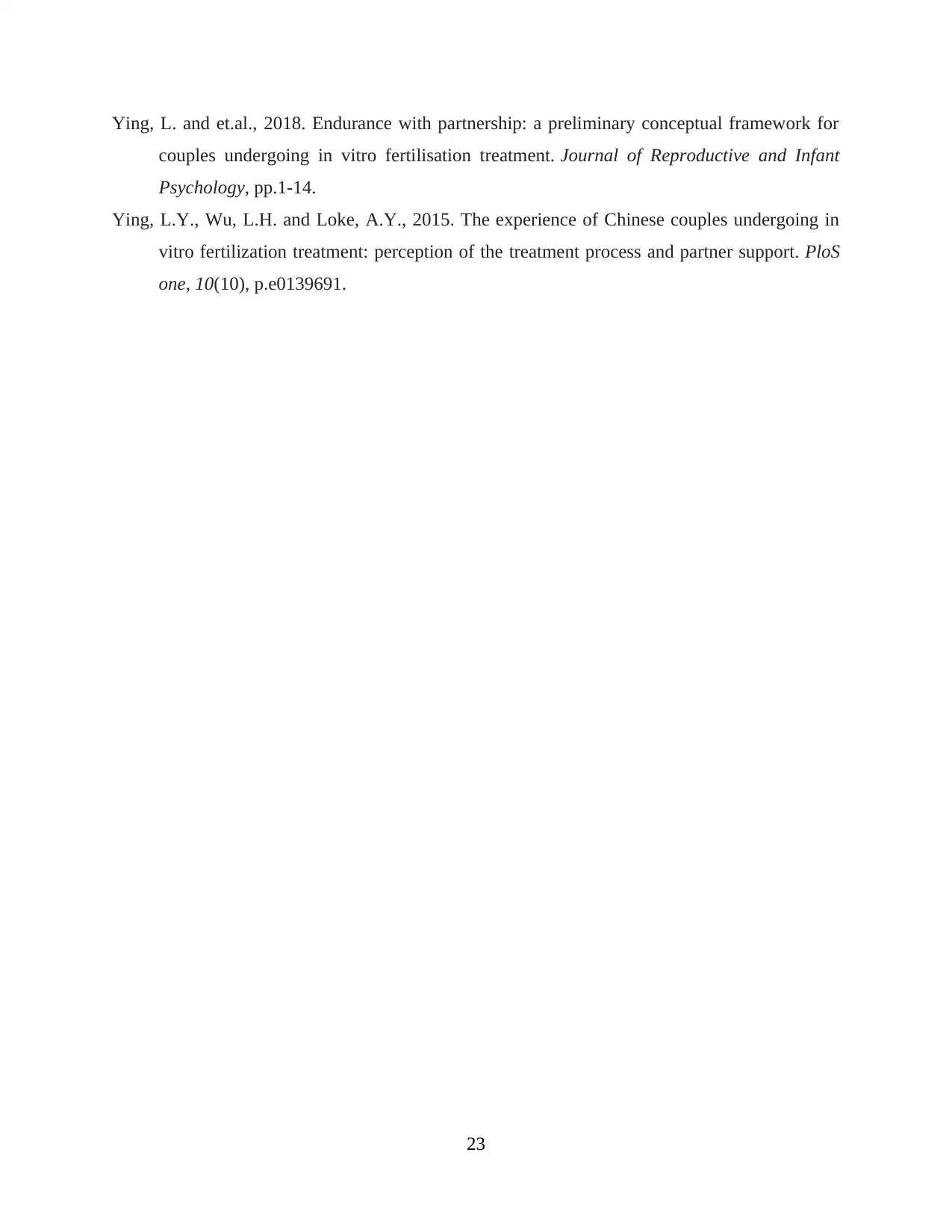
Ying, L. and et.al., 2018. Endurance with partnership: a preliminary conceptual framework for
couples undergoing in vitro fertilisation treatment. Journal of Reproductive and Infant
Psychology, pp.1-14.
Ying, L.Y., Wu, L.H. and Loke, A.Y., 2015. The experience of Chinese couples undergoing in
vitro fertilization treatment: perception of the treatment process and partner support. PloS
one, 10(10), p.e0139691.
23
couples undergoing in vitro fertilisation treatment. Journal of Reproductive and Infant
Psychology, pp.1-14.
Ying, L.Y., Wu, L.H. and Loke, A.Y., 2015. The experience of Chinese couples undergoing in
vitro fertilization treatment: perception of the treatment process and partner support. PloS
one, 10(10), p.e0139691.
23
1 out of 25
Your All-in-One AI-Powered Toolkit for Academic Success.
+13062052269
info@desklib.com
Available 24*7 on WhatsApp / Email
![[object Object]](/_next/static/media/star-bottom.7253800d.svg)
Unlock your academic potential
© 2024 | Zucol Services PVT LTD | All rights reserved.
